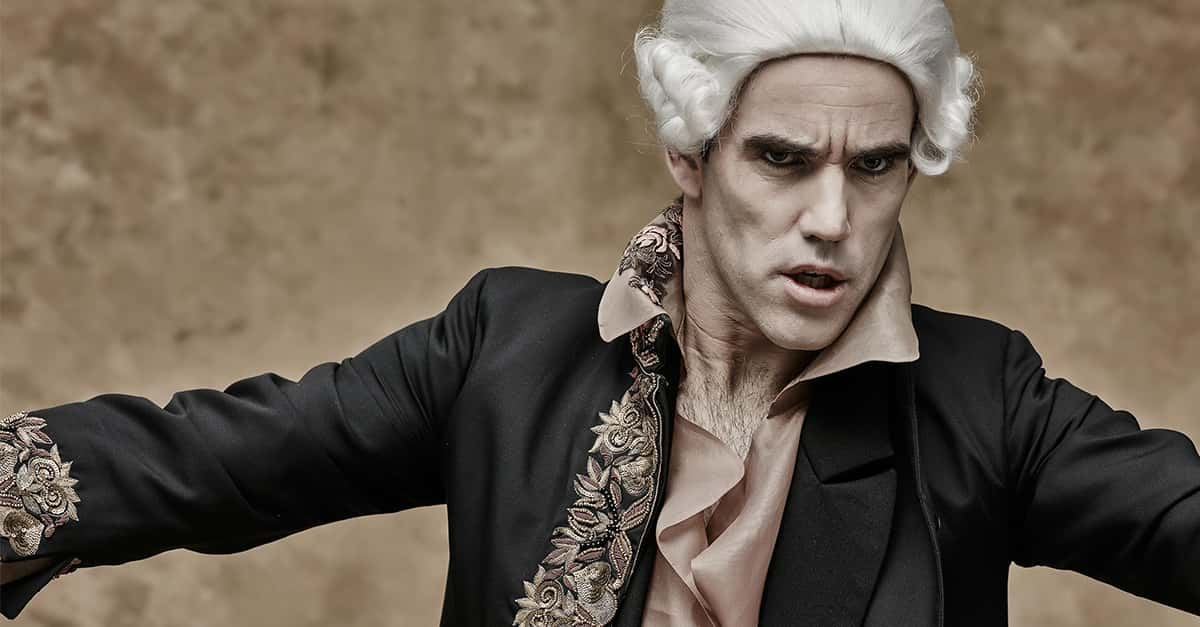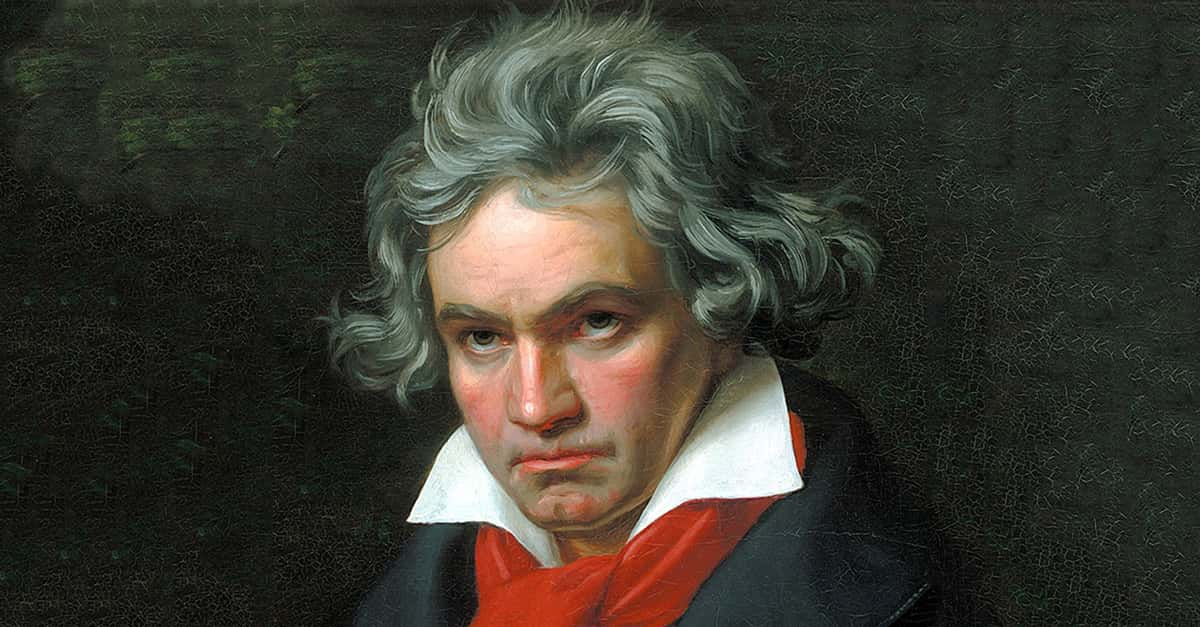“I cannot write poetically, for I am no poet. I cannot make fine artistic phrases that cast light and shadow, for I am no painter. I can neither by signs nor by pantomime express my thoughts and feelings, for I am no dancer; but I can by tones, for I am a musician.”—Wolfgang Amadeus Mozart
When it comes to classical music, there are a few names that just about anyone knows regardless of whether or not they know anything about the genre. Perhaps more than any other, Mozart may be the most recognizable name when it comes to classical composers. Wolfgang Amadeus Mozart was an Austrian composer during the Classical era. In his lifetime, he composed a staggering 600 works, his compositions ranging from symphonies to operas to choral music. He is one of the most enduringly popular composers of any era, and he has had an indelible effect on generation after generation of composers in all genres and styles. Below are 46 musical facts about the talented composer.
Mozart Facts
1. Birthday Bells
In honor of Mozart’s 250th birthday in 2006, all of the church bells in Salzburg rang at the same time at the exact hour of his birth. Forget birthday candles—now that’s a celebration!
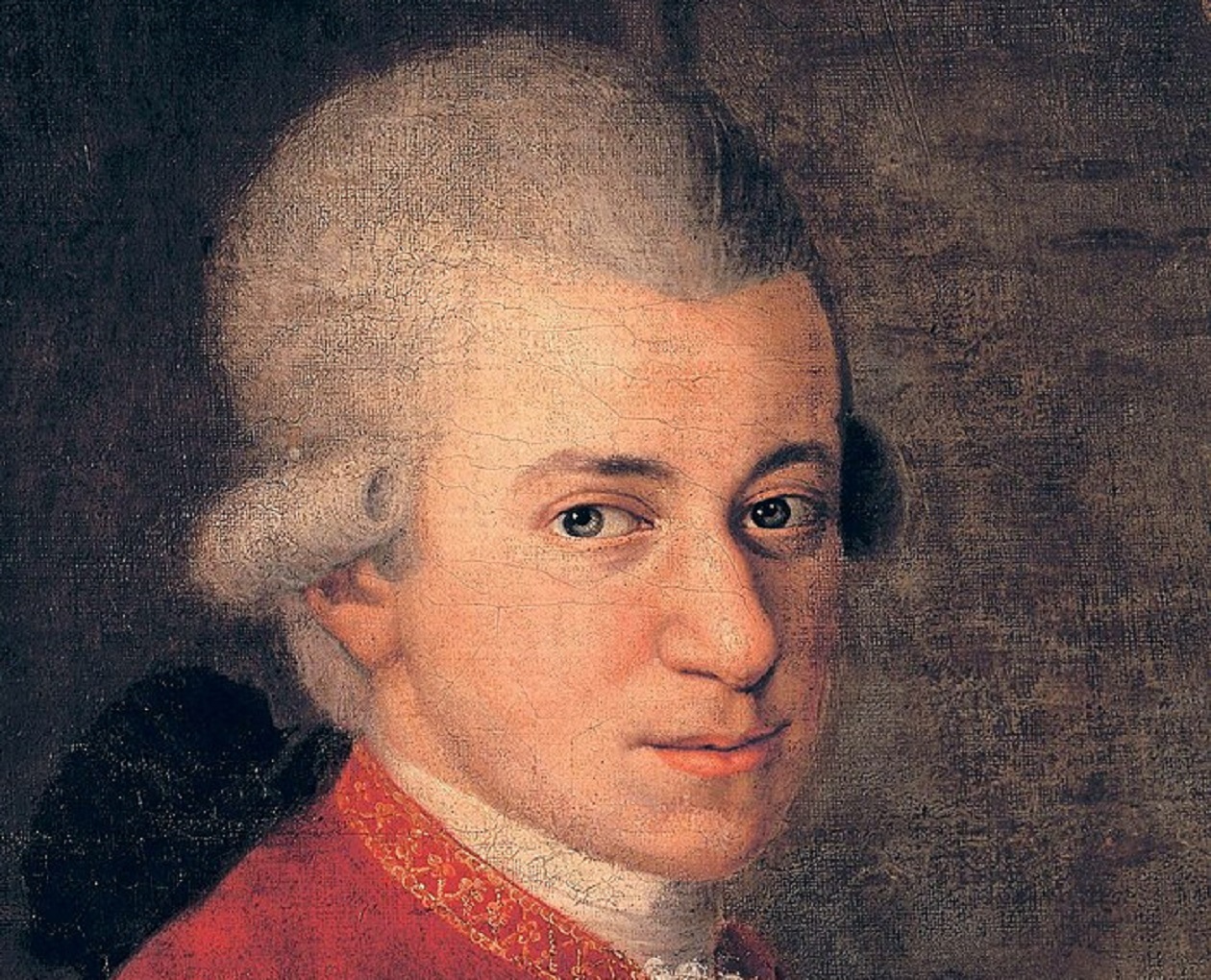 Johann Nepomuk della Croce, Wikimedia Commons
Johann Nepomuk della Croce, Wikimedia Commons
2. Doing it Right
While other composers enjoyed using unconventional fingerings in their works, Mozart was known to value correct fingering. He played piano smoothly and with perfect execution. He felt that technical virtuosity was merely a means of showing off, and instead preferred to just play as it was meant to be played. Whatever works!
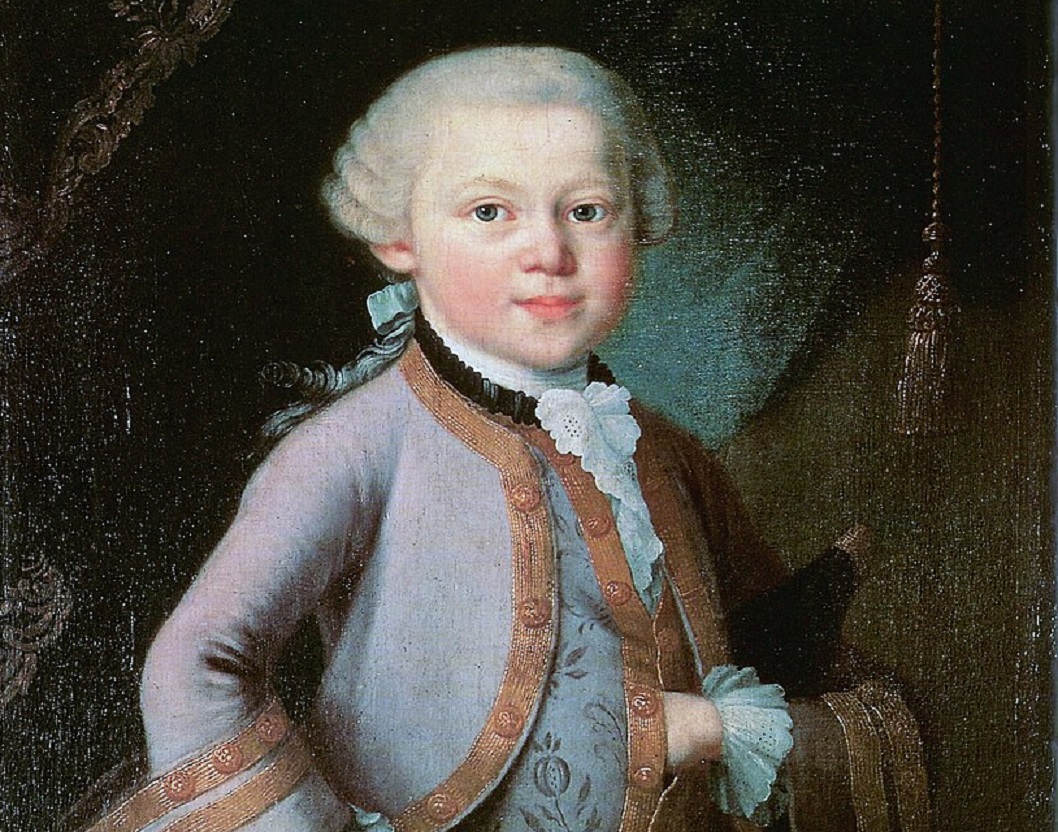 Possibly Pietro Antonio Lorenzoni, Wikimedia Commons
Possibly Pietro Antonio Lorenzoni, Wikimedia Commons
3. Composed for Himself
Most of Mozart’s work was commissioned by others, but his second piano concerto was just for him. In a letter to his father, he wrote that he “played whatever occurred to him at the moment,” and specifically asked that no one else be allowed to play it but him.
 Rudolph Hoffmann, Wikimedia Commons
Rudolph Hoffmann, Wikimedia Commons
4. Putting the Amadeus in Mozart
Although the world knows him as Wolfgang Amadeus Mozart, that’s not exactly how he was christened, and his name at birth was Joannes Chrysostonus Wolfgangus Theophilus Mozart. Theophilus is Greek for "loved one" and Amadeus is a Latin translation of the Greek. Wolfgang Amadeus Mozart is also how his name was entered in the death records of the Vienna Magistrate, and that seems to be the version that stuck.
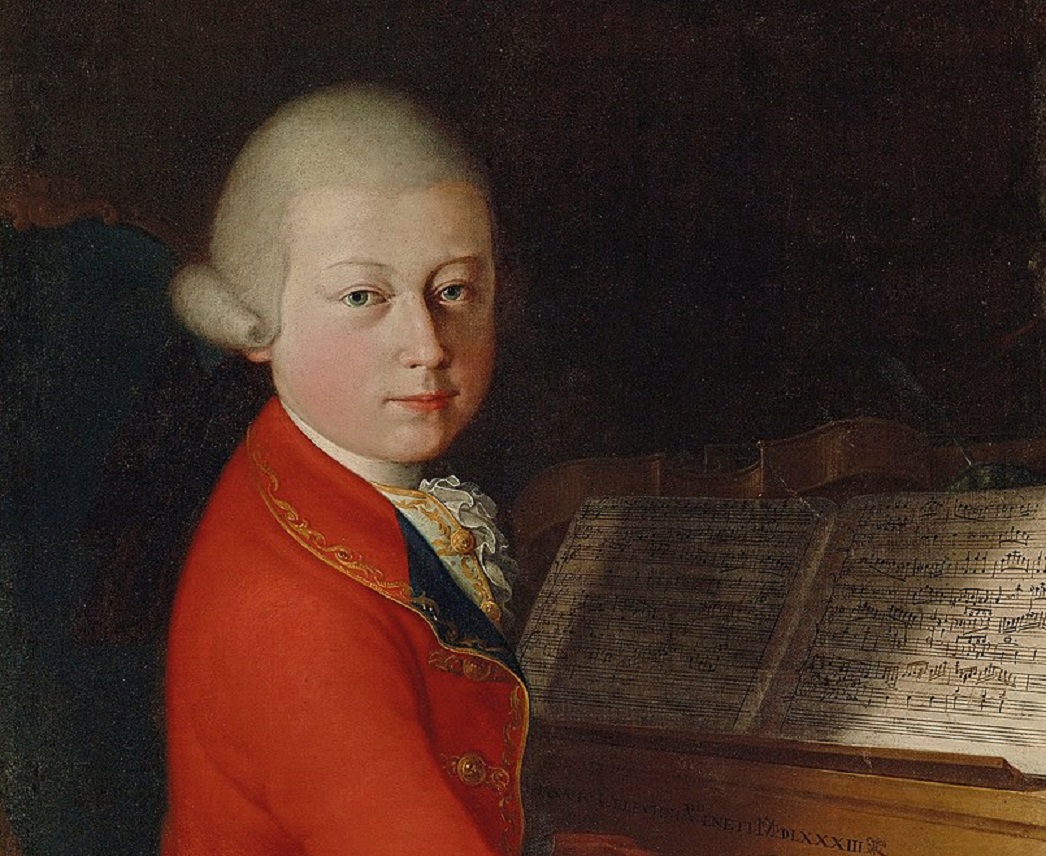 Giambettino Cignaroli, Wikimedia Commons
Giambettino Cignaroli, Wikimedia Commons
5. Rolling Requiem
On September 11, 2002, one year after the 9/11 terrorist attack, choirs from around the world performed Mozart’s “Requiem Mass in D Minor” for 24 hours. The Rolling Requiem project featured 145 choirs from 40 states, 23 countries and 20 different time zones, beginning at their local time of 8:46am- the moment of the first attack.
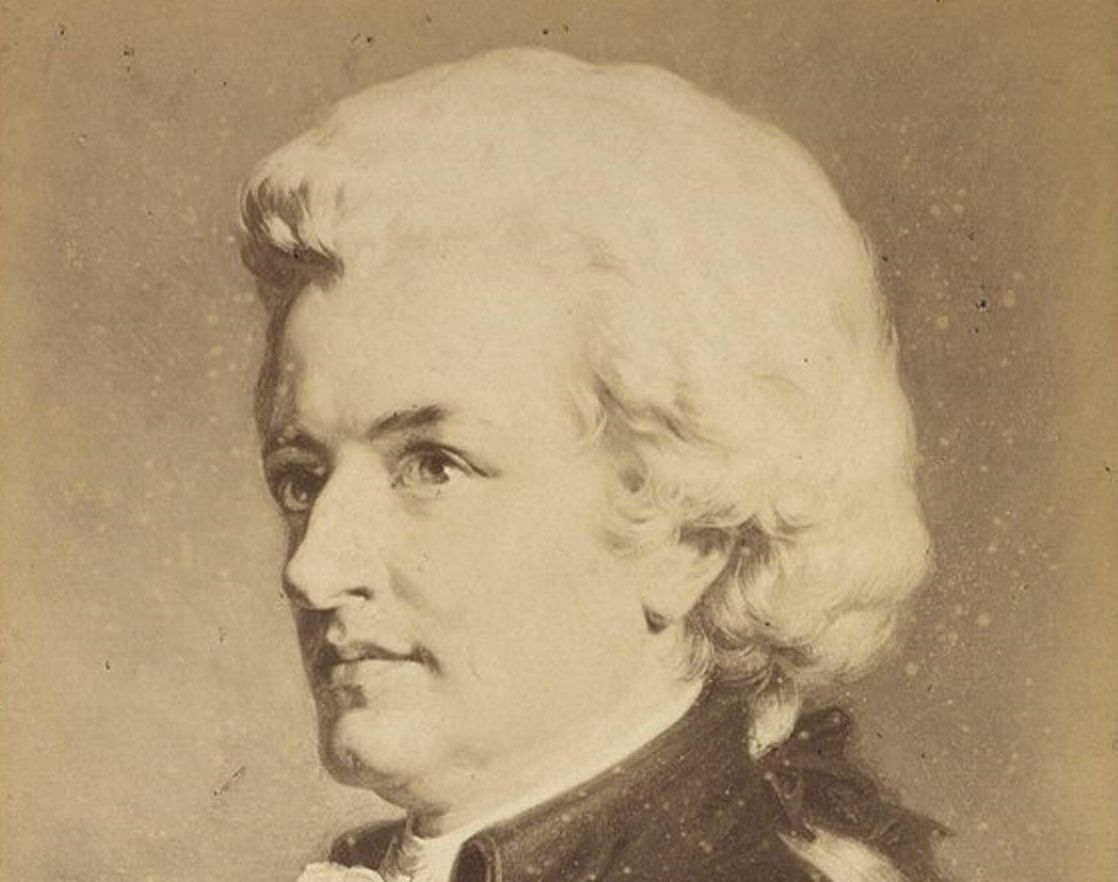 Friedrich Bruckmann, Wikimedia Commons
Friedrich Bruckmann, Wikimedia Commons
6. Sounds Just Like Him!
Have you ever wondered what your favorite song would sound like if Mozart played it? That’s exactly what a small group of researchers from Facebook have been working on. They have created an artificial intelligence that can listen to an audio file of any song and convert it into a version of Mozart playing that same song. Similarly to the way humans can hear music and repeat it, the AI creates its own version of the song in a different style. Talk about a futuristic cover band!
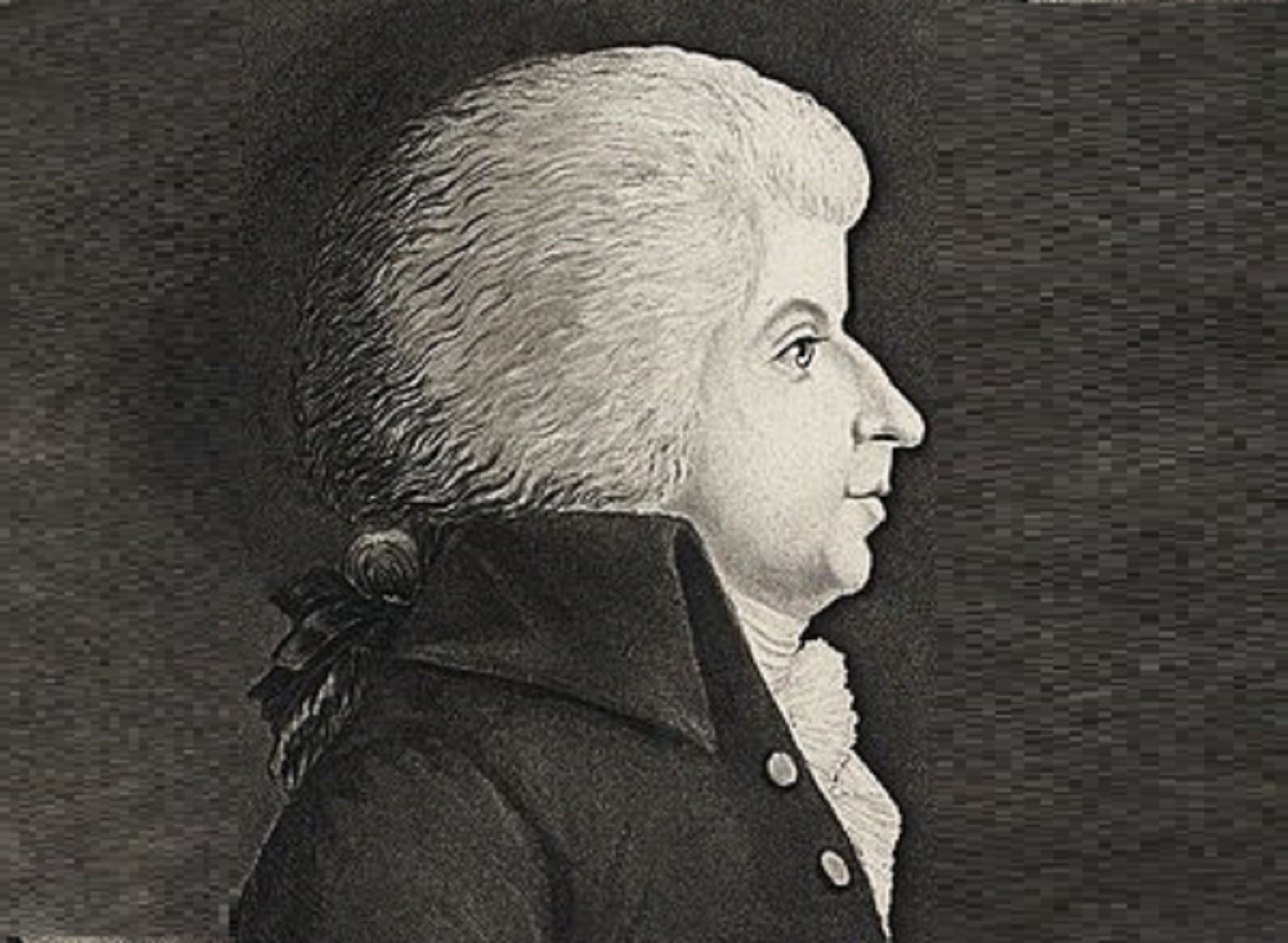 Quenedey, Edmé , Wikimedia Commons
Quenedey, Edmé , Wikimedia Commons
7. Funeral Music
Mozart composed one of his most famous pieces believing that he was writing it for his own funeral. Mozart’s Requiem was anonymously commissioned by Count Franz von Walsegg, who intended to tell everyone that he’d written it for his wife’s funeral. Ironically, Mozart was already dying at the time he started composing it, but he died before he could finish it. Franz Xaver Sussmayr ended up completing the work, and it was played at Mozart’s funeral, so technically, he was right.
 The Saul Zaentz Company, Amadeus (1984)
The Saul Zaentz Company, Amadeus (1984)
8. A Musical Joke
In addition to being a brilliant composer, Mozart was also a big practical joker. Not only did he enjoy playing pranks on people, but he created a piece of music that was literally called “A Musical Joke.” Mozart deliberately used melodies and harmonies that didn’t fit together, and he created passages where it sounded like the horns were out of tune or the strings were being played incorrectly. His main reason for doing it was to make fun of bad composers. This was from the same guy who wrote lyrics for canons with titles such as "Leck mich im Arsch" and "Leck mir den Arsch fein recht schön sauber," so that should give you an idea of where his mind was at.
 The Saul Zaentz Company, Amadeus (1984)
The Saul Zaentz Company, Amadeus (1984)
9. Pool Shark
Billiards was Mozart’s key way of relaxing, and apparently he was also really good at it. In his memoirs, the Irish tenor Michael Kelly referred to playing billiards with Mozart and usually losing. He was even known to keep paper in his pocket when he went to public billiards rooms, and composed in between turns.
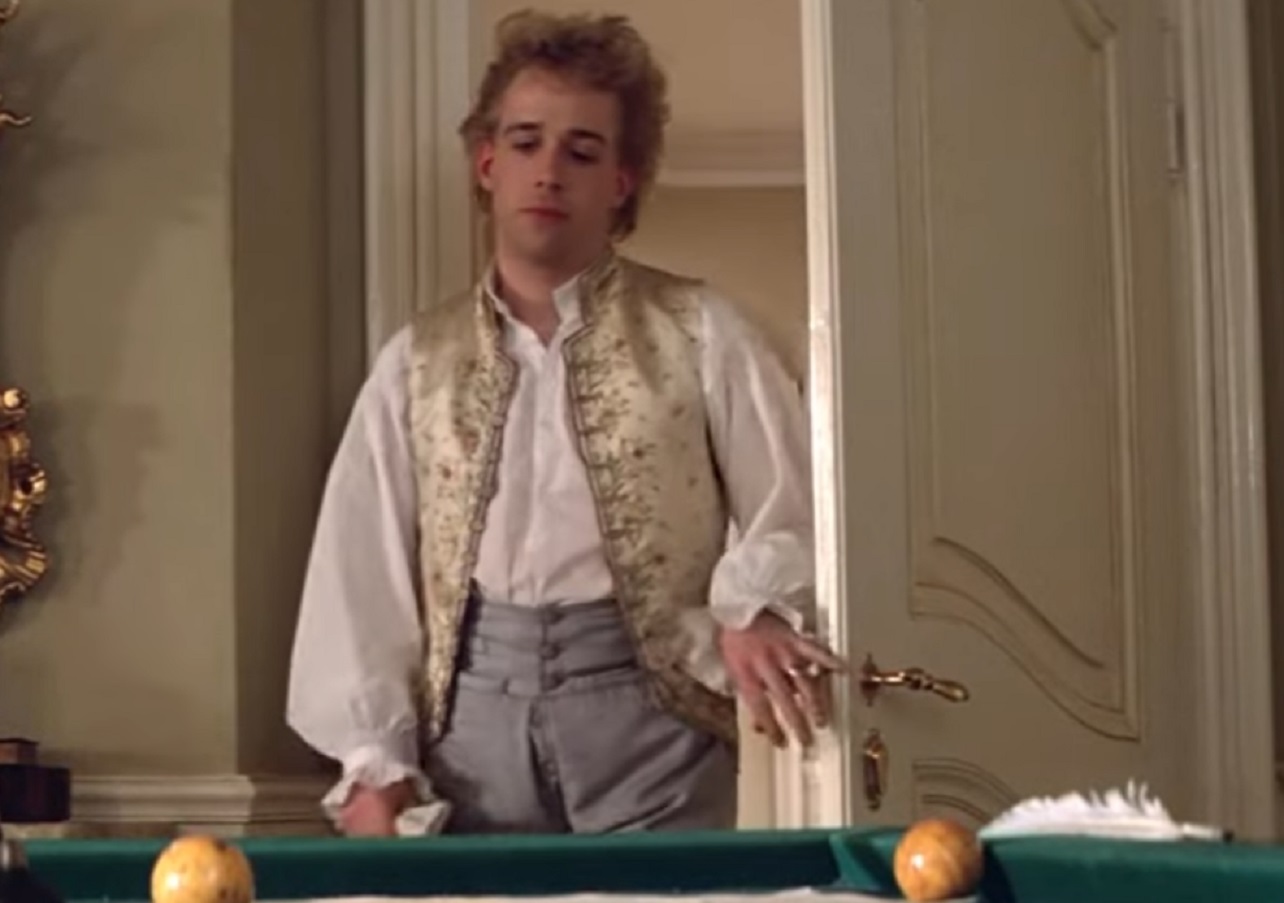 The Saul Zaentz Company, Amadeus (1984)
The Saul Zaentz Company, Amadeus (1984)

History's most fascinating stories and darkest secrets, delivered to your inbox daily.
10. Singing Starlings
Mozart had a number of pets, but perhaps the most notable was a pet starling who could apparently sing the opening to his “Piano Concerto Number 17, K 453.” Mozart was said to have taught the bird the theme and in his record of purchase, he wrote “That’s fine.” He also noted that the bird sang one wrong note. The travesty!
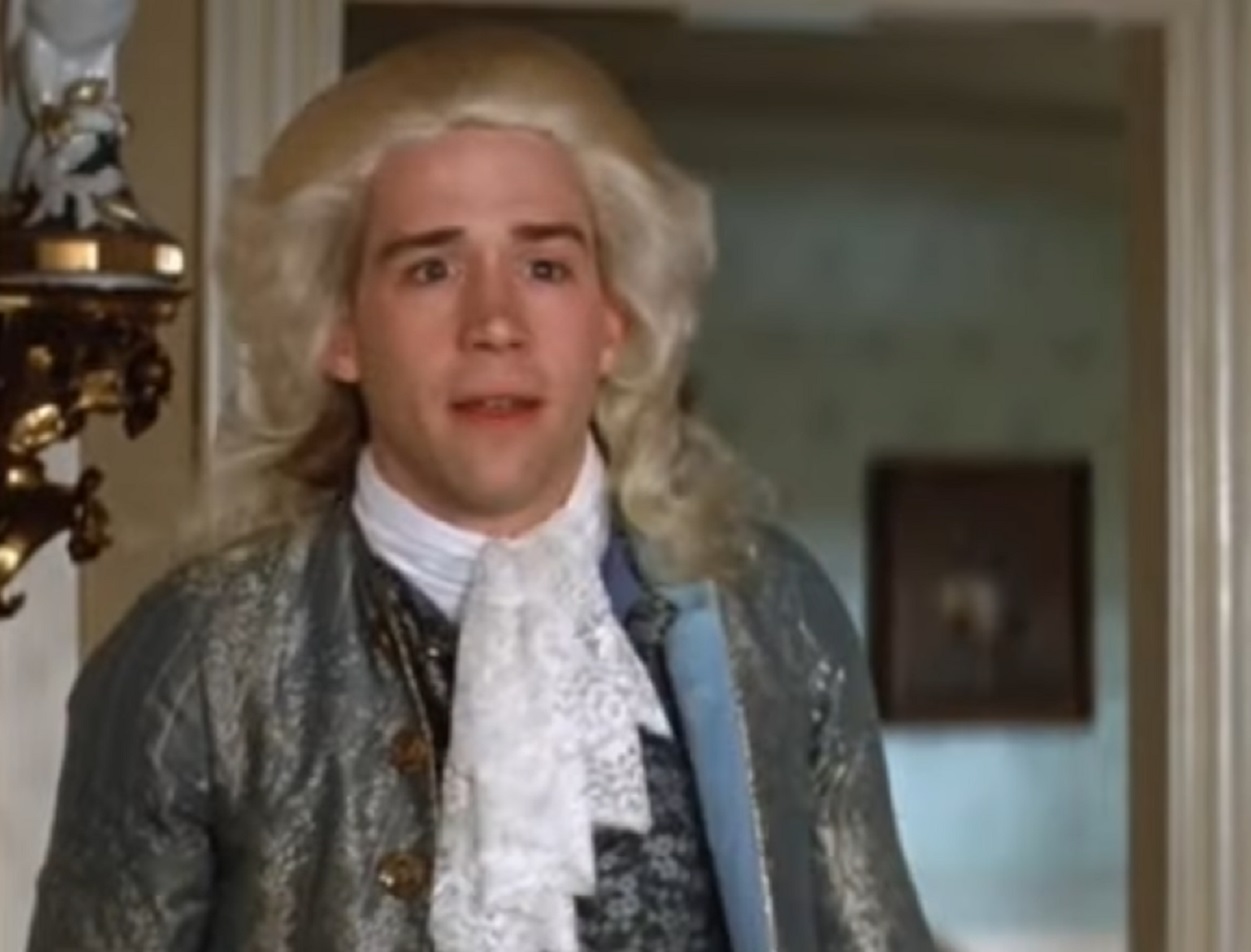 The Saul Zaentz Company, Amadeus (1984)
The Saul Zaentz Company, Amadeus (1984)
11. A One-Man Orchestra
For most people, mastering an instrument or two would be a major accomplishment, but not Mozart! He was an expert on keyboard, violin, and viola, and he could play pretty much every other instrument in the orchestra well enough to compose.
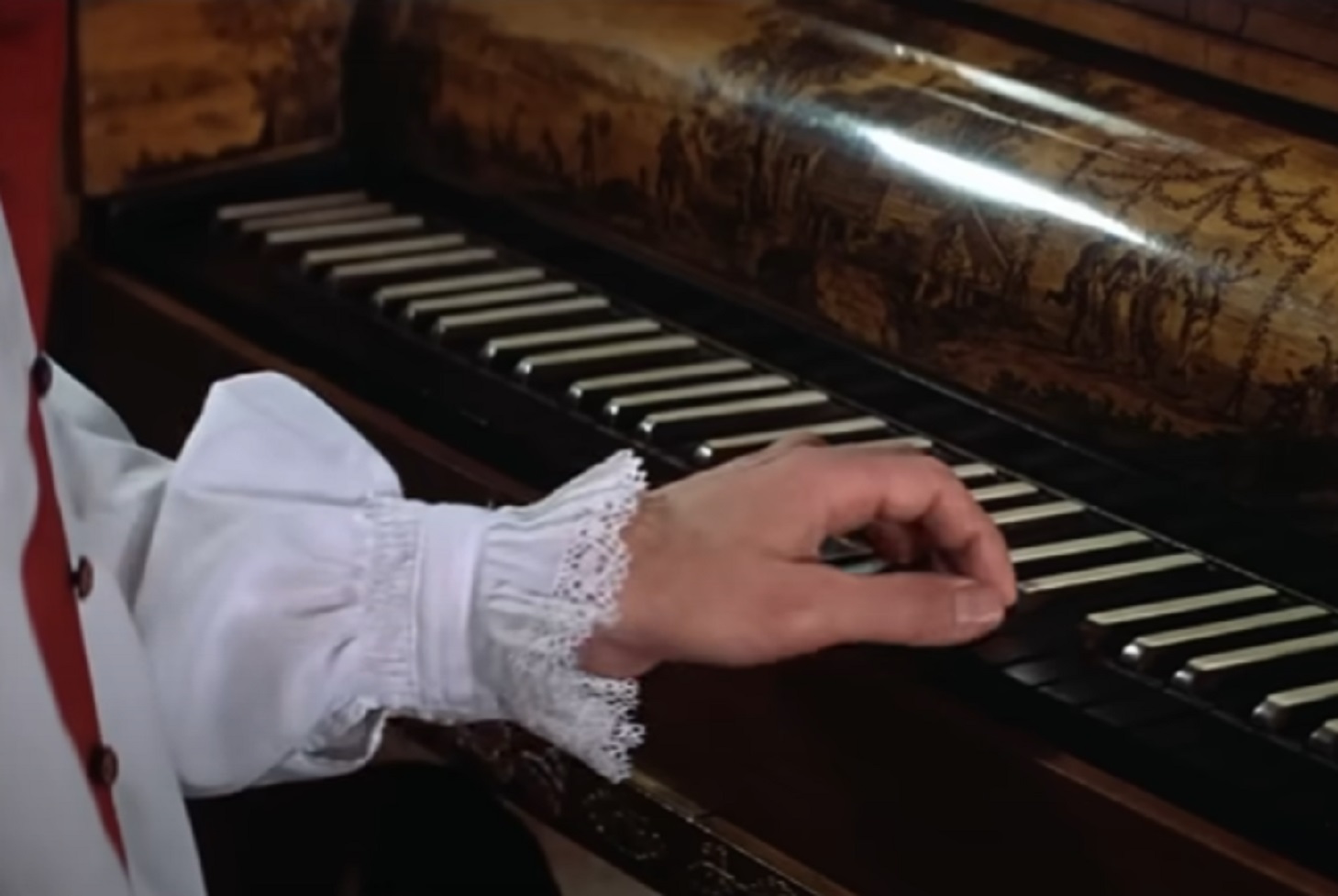 The Saul Zaentz Company, Amadeus (1984)
The Saul Zaentz Company, Amadeus (1984)
12. Wunderkind
Every parent thinks their kid is a wonder child, but Mozart genuinely deserved the nickname. He may have only started playing the piano at age 4, but by age 6 he was already skilled enough to start composing his own music. He composed his first mass at age 12, and his first opera at 14. What were you doing at that age?
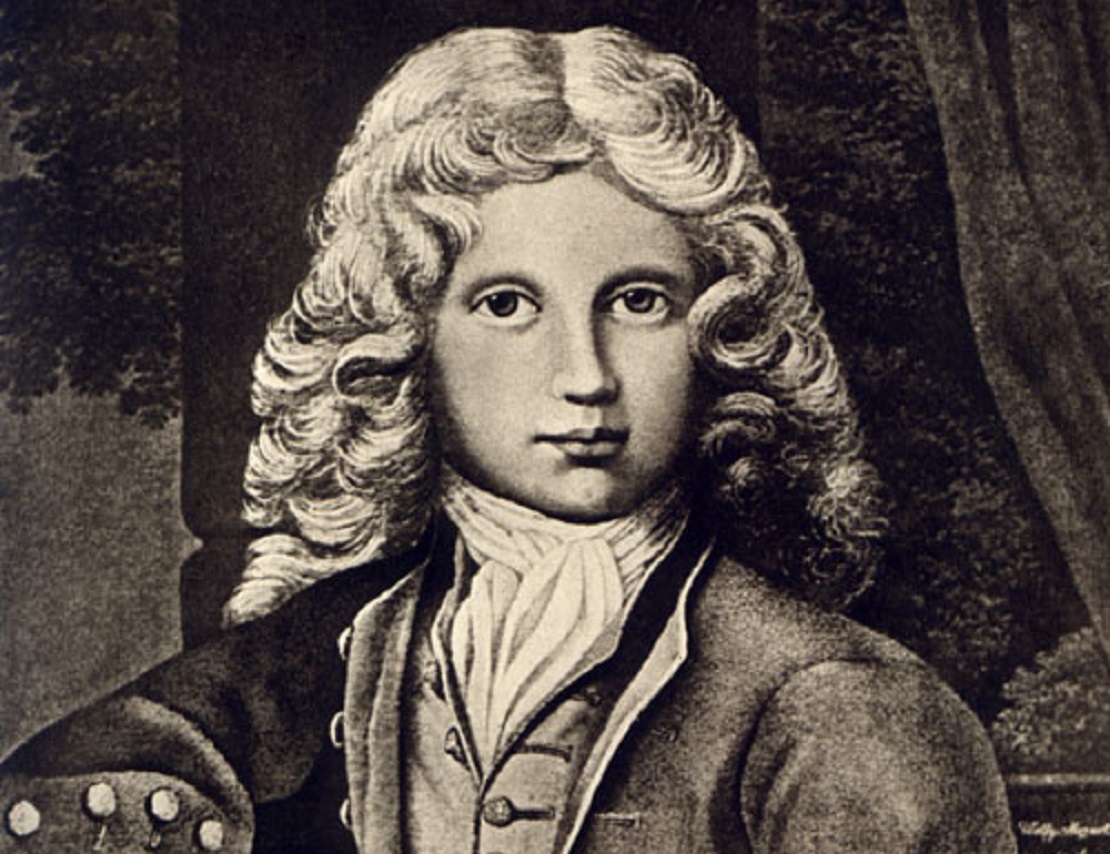 J_Vander_Smissen, Wikimedia Commons
J_Vander_Smissen, Wikimedia Commons
13. The Black Mozart
Composer and violinist Joseph Bologne, otherwise known as Chevalier de St. Georges was born to a black slave mother and a white wealthy plantation owner in the French colony of Guadalupe in 1745. He composed for violin as well as composing operas and chamber pieces and even performed for Marie Antoinette. He was so talented that he became known as “The Black Mozart” and Mozart even copied one of his violin concertos. Totally uncool move, but pretty high praise!
 William Ward, Wikimedia Commons
William Ward, Wikimedia Commons
14. Kiss Please
At the age of 7, Mozart’s father brought him and his equally talented sister Maria Anna to Paris in hopes that they could perform at the Palace of Versailles. Leopold got his wish, and Mozart played for King Louis XV and his mistress Madame de Pompadour. After the performance, Mozart wanted to give Mme. Pompadour a kiss, but she refused him. On the bright side, the kisses from King Louis’ daughters went a long way to making up for the Marquise’s slight.
15. Musical Memory
In the 17th century, the Vatican commissioned a song that was meant to be performed solely in the Sistine Chapel. The composition was a secret for 150 years. That was until a precocious Mozart, 14 years old at the time, listened to the piece twice. He then transcribed it from memory, and produced the first unauthorized copy of the song.
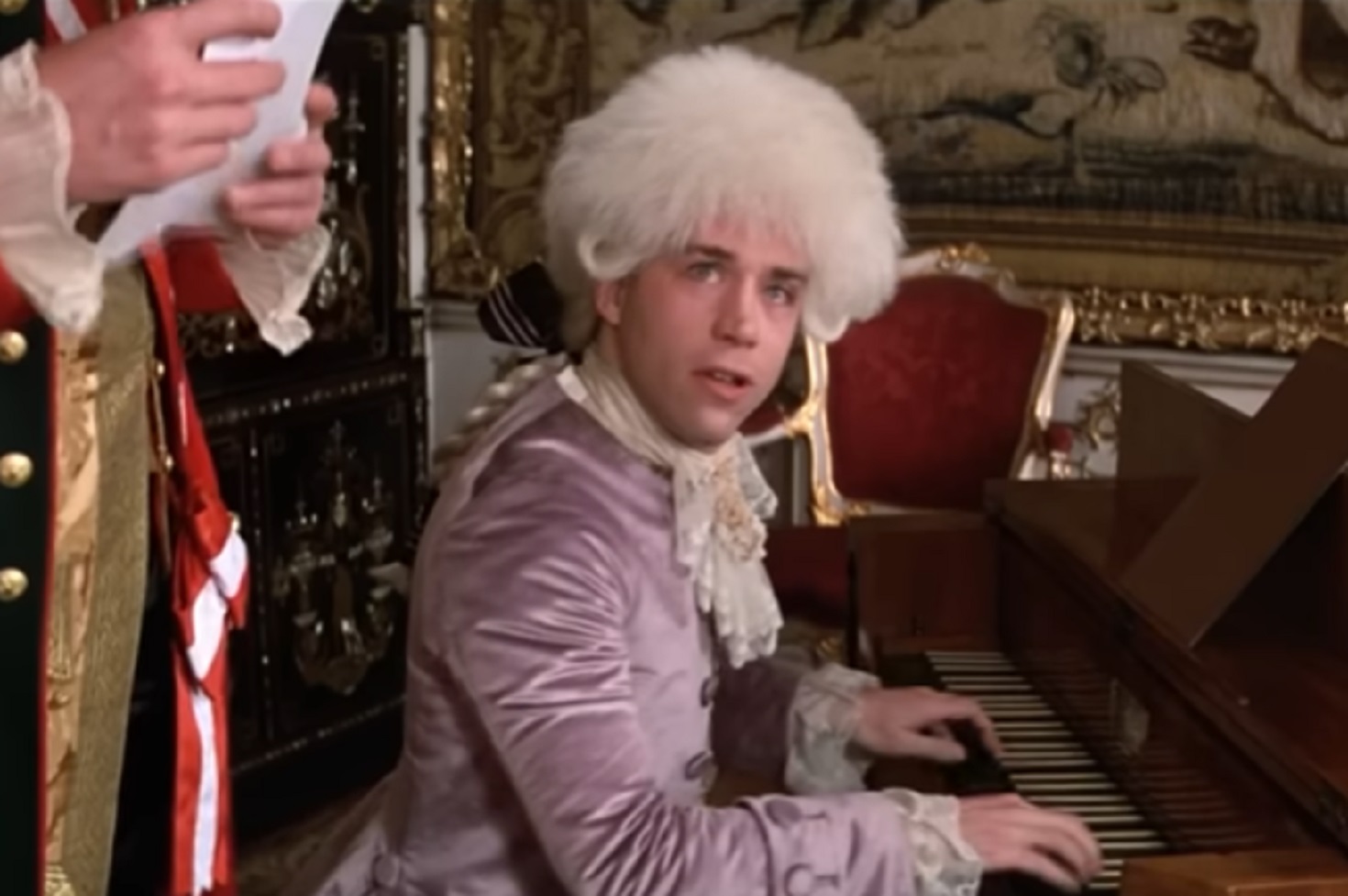 The Saul Zaentz Company, Amadeus (1984)
The Saul Zaentz Company, Amadeus (1984)
16. Southpaw
Mozart was thought to be either purely left-handed or at the very least, ambidextrous. He would have been forced to write with his right, which could explain why he wrote and composed with both. Rachmaninoff, Bach, Paganini and Beethoven were also all believed to be left-handed, so maybe there’s something to the stereotype that lefties are more creative!
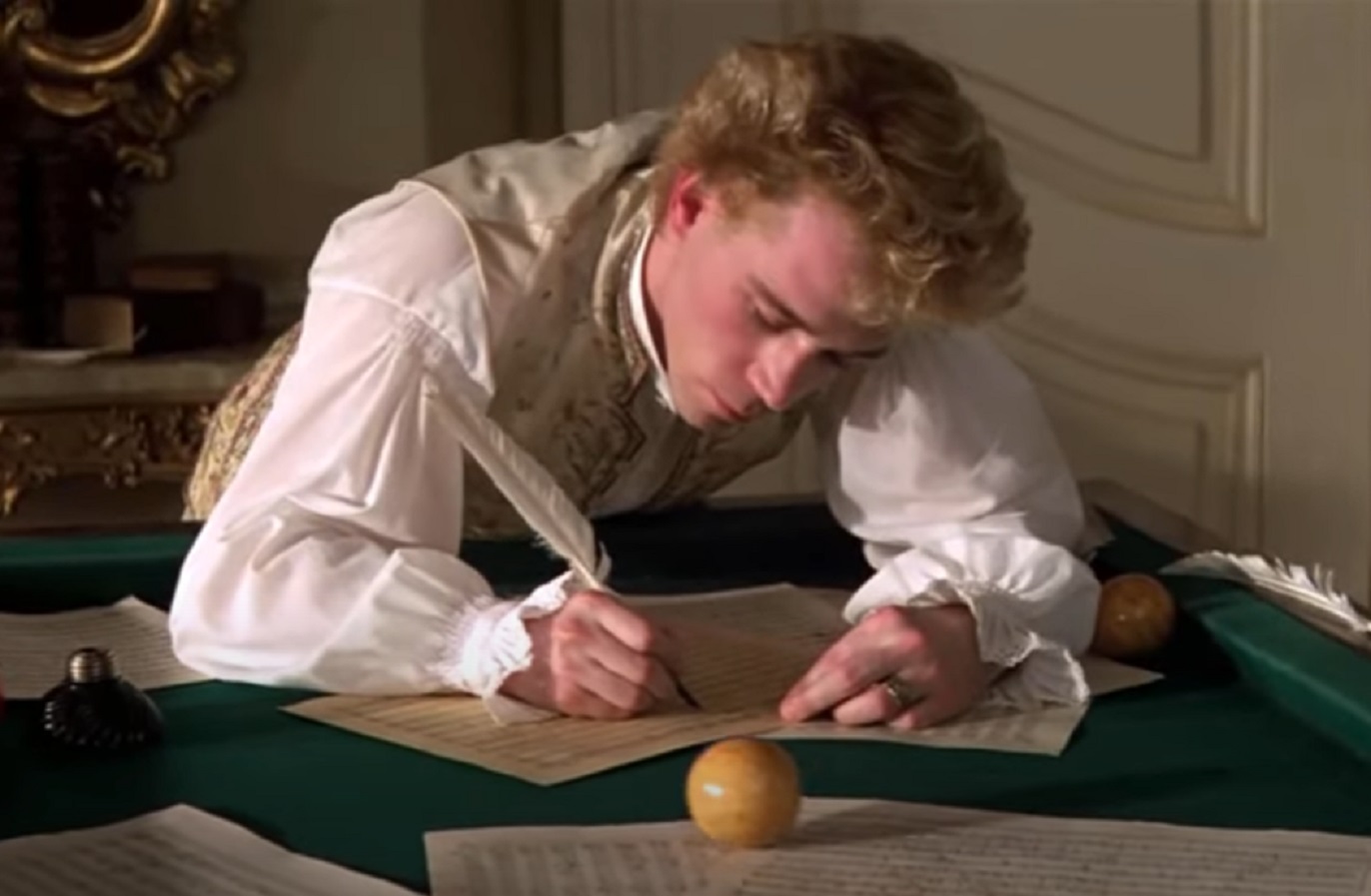 The Saul Zaentz Company, Amadeus (1984)
The Saul Zaentz Company, Amadeus (1984)
17. Mozart’s Frog
The Eleutherodactylus Amadeus species of frog is found in southwestern Haiti. It takes its name from Mozart because it makes a sound that closely resembles musical notes. But can it hold a tune?
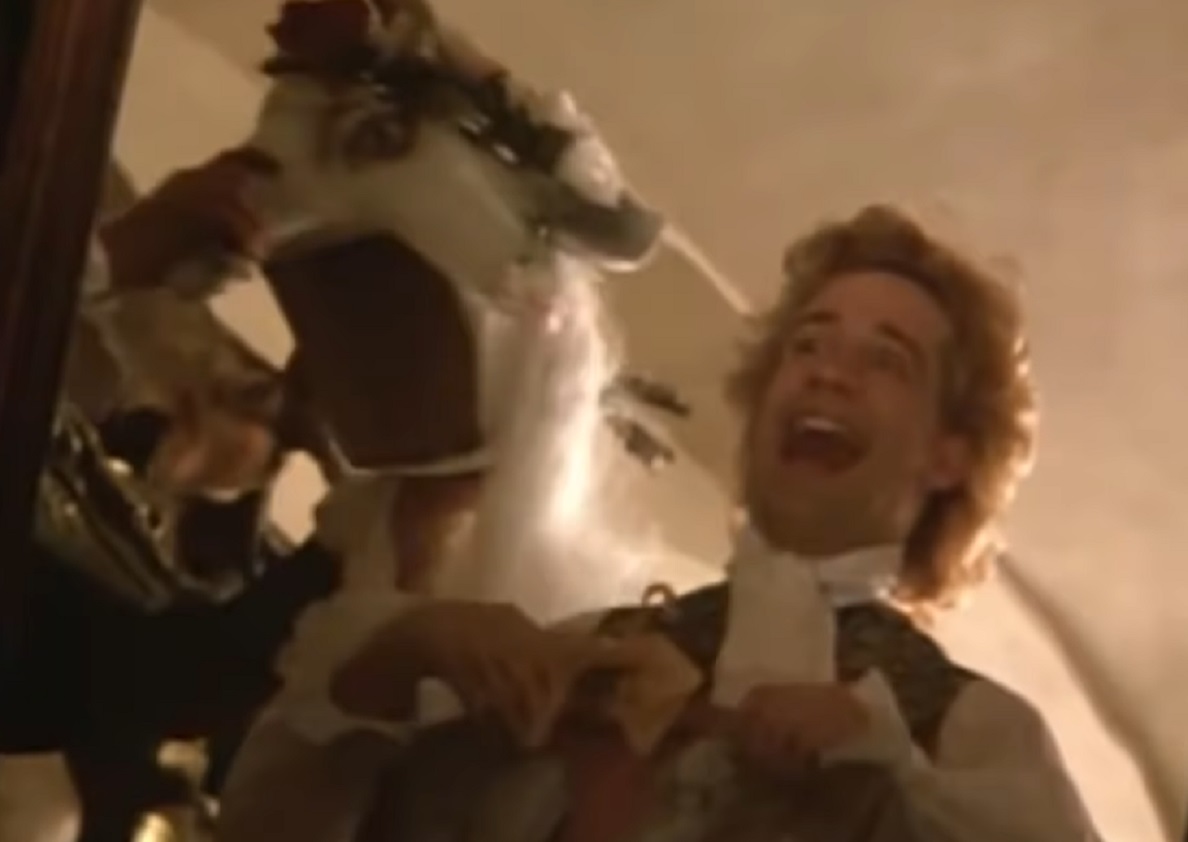 The Saul Zaentz Company, Amadeus (1984)
The Saul Zaentz Company, Amadeus (1984)
18. No Way!
Child prodigies weren’t exactly a dime a dozen in Mozart’s era, so it really isn’t surprising that when he performed in London at age 9, some people didn’t believe that a child could possibly be that good and accused him of being an adult dwarf. I don’t suppose it mattered that he looked, sounded and acted like a child.
19. Not That!
The reported story goes that when Beethoven was 16 years old he travelled to Vienna to meet his idol—Mozart. He was feeling particularly cranky that day and told Beethoven to play something. Beethoven first played a part of Mozart’s “Piano Concerto Number 24 in C Minor,” to which Mozart replied “Not that, anybody can play that. Play something of your own." Beethoven did, and Mozart was so impressed, he told his wife “Watch out for that boy. One day he will give the world something to talk about."
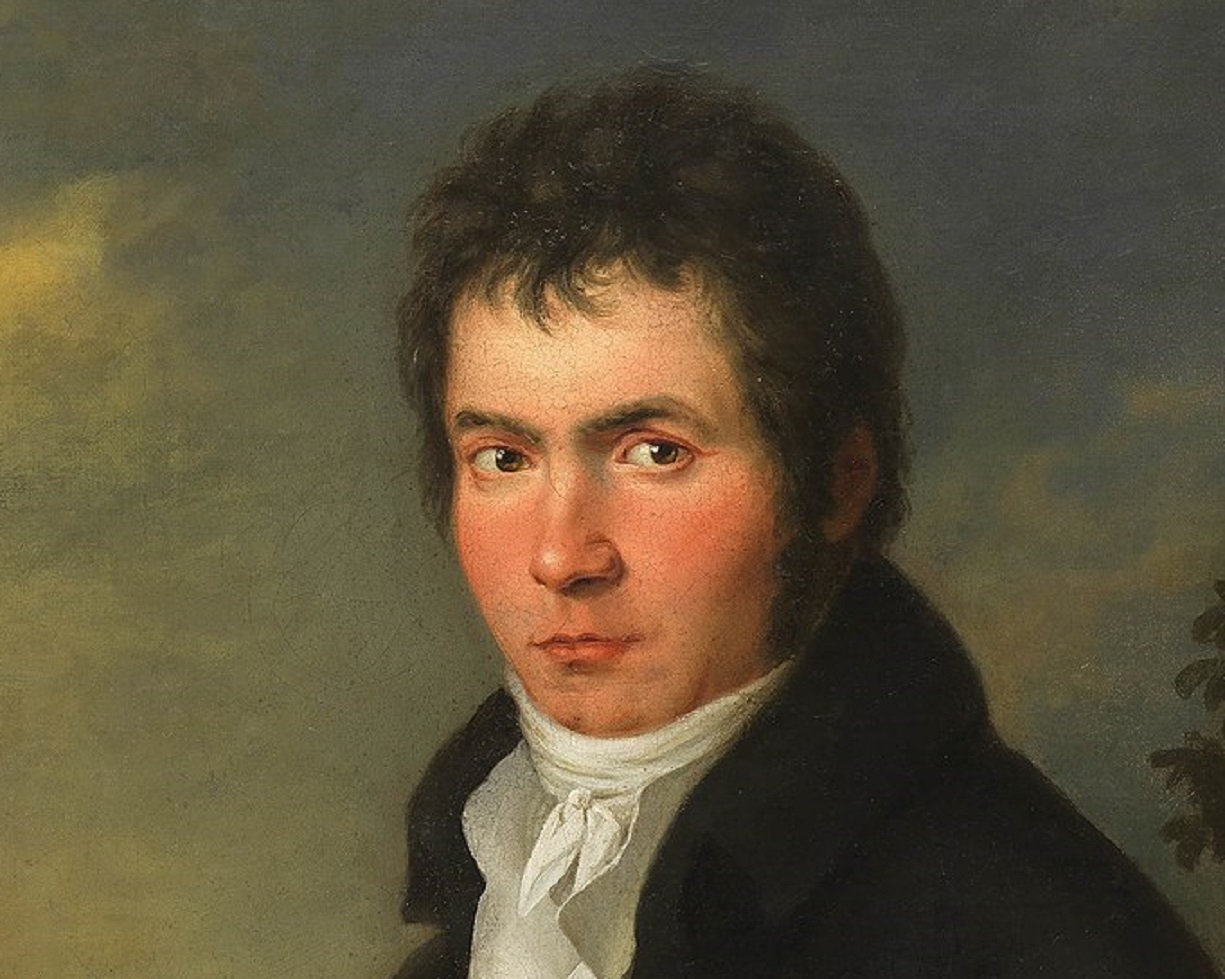 Josef Willibrord Mähler, CC BY 3.0, Wikimedia Commons
Josef Willibrord Mähler, CC BY 3.0, Wikimedia Commons
20. A Week and a Day
If you were to drop everything and listen to Mozart’s entire body of work, it would take you 202 hours, or about 8.4 days. That’s a lot of music for a guy who died well before the age of 40!
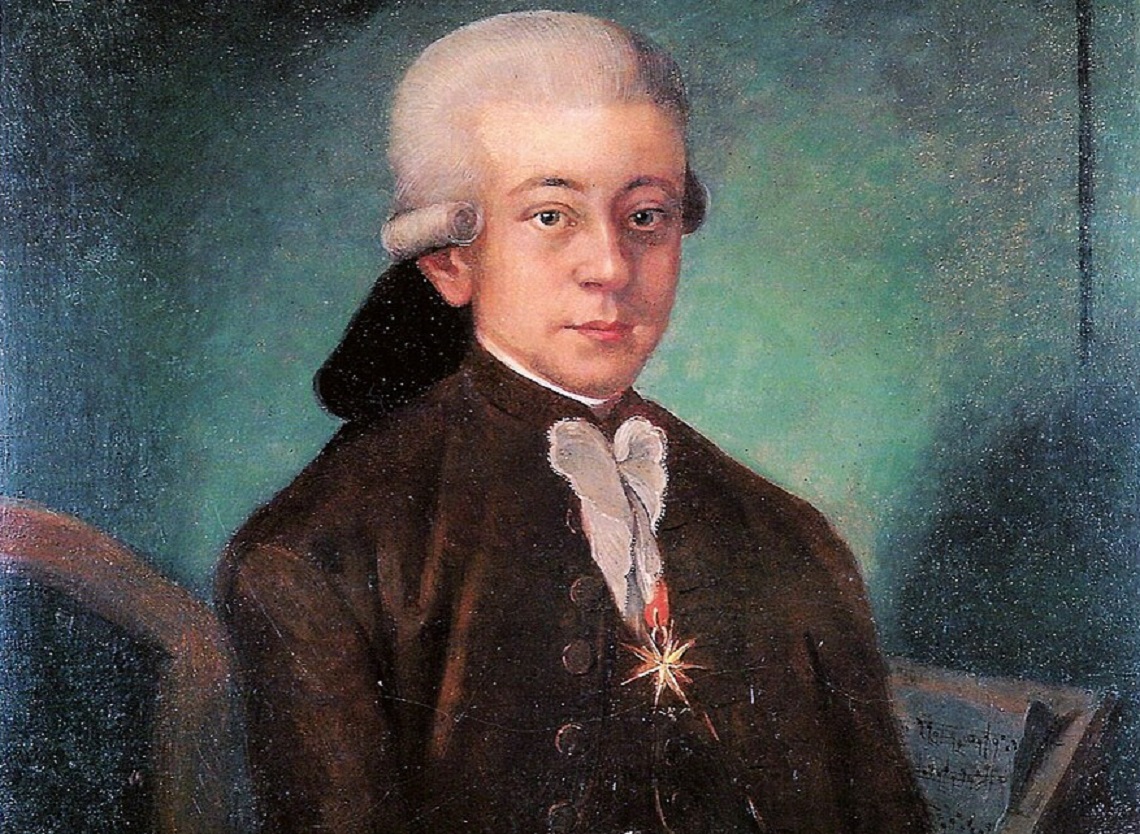 Jabonsbachek, CC BY-SA 4.0, Wikimedia Commons
Jabonsbachek, CC BY-SA 4.0, Wikimedia Commons
21. The Famous Song He Didn’t Compose
The popular children’s song “Twinkle Twinkle Little Star” is commonly attributed to Mozart, but it turns out that he didn’t actually compose the tune—just a series of variations on what was a popular French folk tune at the time. As for “Twinkle Twinkle Little Star?” It originated as a poem by the English author Jane Taylor, and was set to the same tune as the aforementioned French folk song sometime around 1838. So who did compose the popular tune? To this day, nobody knows, but it definitely wasn’t Mozart.
 Unknown Author, Wikimedia Commons
Unknown Author, Wikimedia Commons
22. Like Father, Like Son
Mozart’s father Leopold was a talented composer, conductor and violinist. Among his most famous pieces were the “Trumpet Concerto” and the “Toy Symphony” (which was wrongly attributed to Haydn), but he gave up his career to teach and manage Mozart and his sister. The same year that Mozart was born, he also published a manual on violin playing, which today is one of the main sources on performance practice in the 18th century. Now we know where Mozart got it!
 Mozart's birthplace, Wikimedia Commons
Mozart's birthplace, Wikimedia Commons
23. A Windless Symphony
When Mozart composed his “Symphony No. 33,” it had no clarinets. In fact, very few of his early symphonies used clarinets at all. While he certainly would have been familiar with the clarinet, he didn’t use them in his works until 1771. One of the reasons for this might have been that they just weren’t common in orchestras—the Salzburg Orchestra where he was in residence just didn’t have clarinets. He also just may not have found the proper inspiration yet because once he met clarinetist Anton Stadler, he started composing clarinet pieces specifically for him.
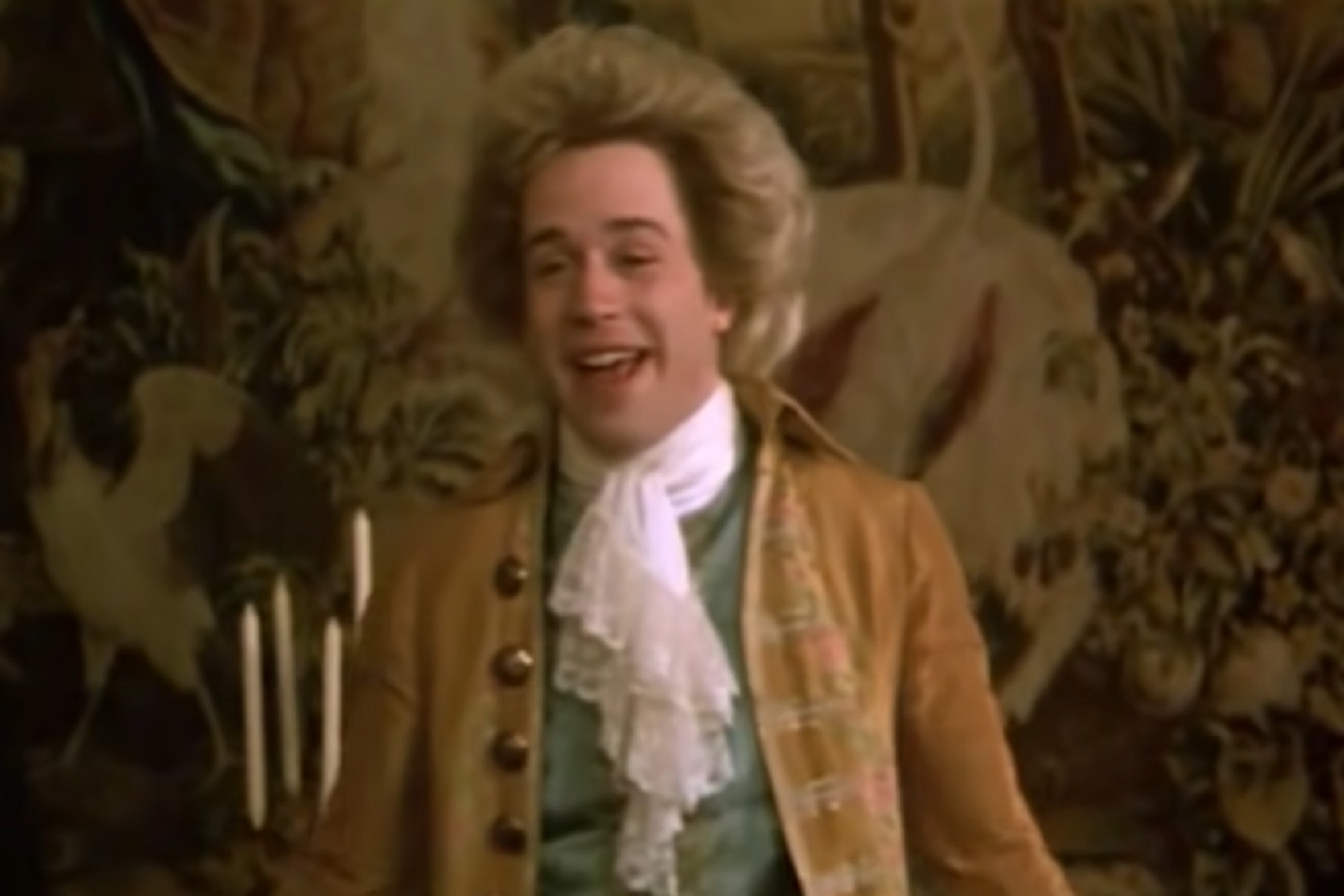 The Saul Zaentz Company, Amadeus (1984)
The Saul Zaentz Company, Amadeus (1984)
24. Good Times
At age 21, Mozart was already an accomplished composer, but he was also an unemployed bum. His father Leopold sent his mother along with him on a search for employment, but to no avail. This didn’t stop them from having fun however, and in letters to his father, Mozart describes living like royalty and says that he has “even grown slightly fat.” Needless to say, Daddy wasn’t impressed.
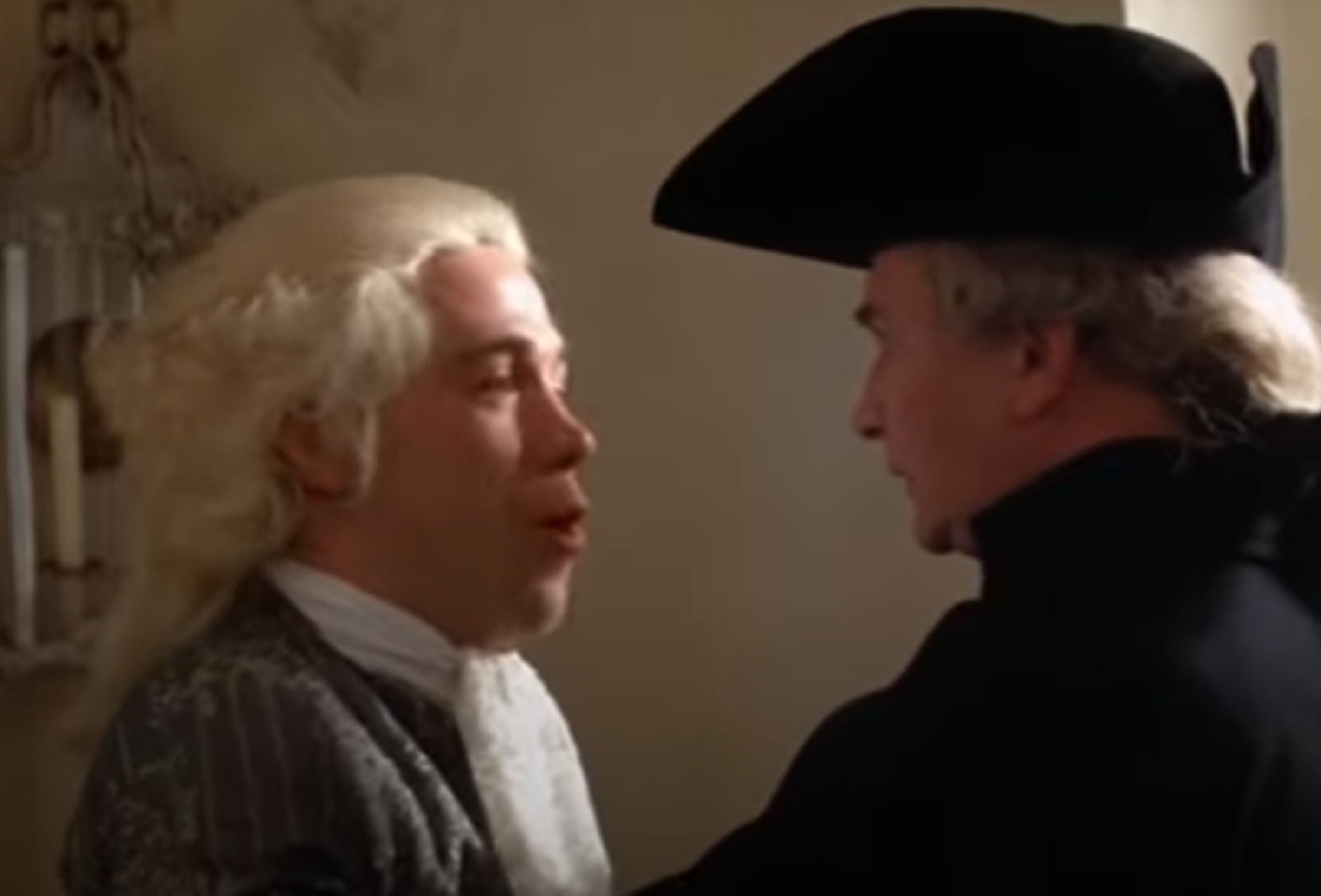 The Saul Zaentz Company, Amadeus (1984)
The Saul Zaentz Company, Amadeus (1984)
25. Living it Up
What happens when you let a 21-year-old loose in Europe with no supervision? He hooks up with some girls and totally forgets about what he was supposed to be doing. Instead of going to Paris to introduce himself to court as directed, he managed to fall in love, and he traveled with his future in-laws and their unmarried daughters to The Hague for a concert. Some things never change!
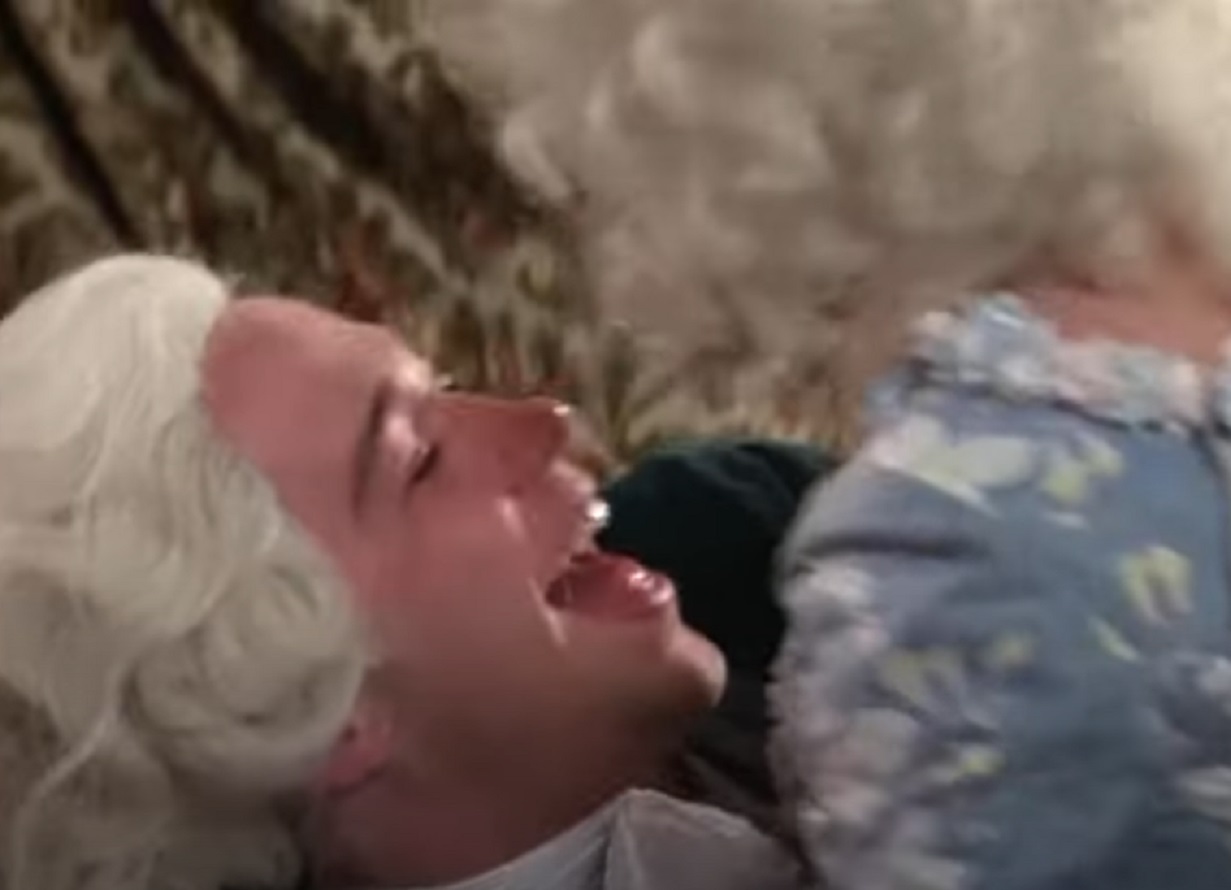 The Saul Zaentz Company, Amadeus (1984)
The Saul Zaentz Company, Amadeus (1984)
26. Not Short, Petite
Mozart was not a tall man. He stood just 5’4” tall and due to his weak constitution, was quite tiny. The one part of him that wasn’t small was his head, and I don’t just mean ego-wise. Compared to the rest of him, his head was somewhat on large side, making him look a bit lopsided.
 The Saul Zaentz Company, Amadeus (1984)
The Saul Zaentz Company, Amadeus (1984)
27. Locating the Body
For 200+ years, speculation and rumor have surrounded Mozart’s burial. He was buried in St. Marx Cemetery in Vienna in an unmarked grave as was the practice at the time, but without anything to mark his grave site, the exact location of his final resting place is a bit of a mystery. In the mid-1800s the site was more-or-less identified—or so they think anyway, and a memorial stone was put up in 1859. Over the years, additional features have been added to the site including a stone angel and a column. The real kicker is that for all of that pomp, nobody can say for sure if that spot is actually where Mozart is buried, so for all anybody knows, we could have gotten it totally wrong!
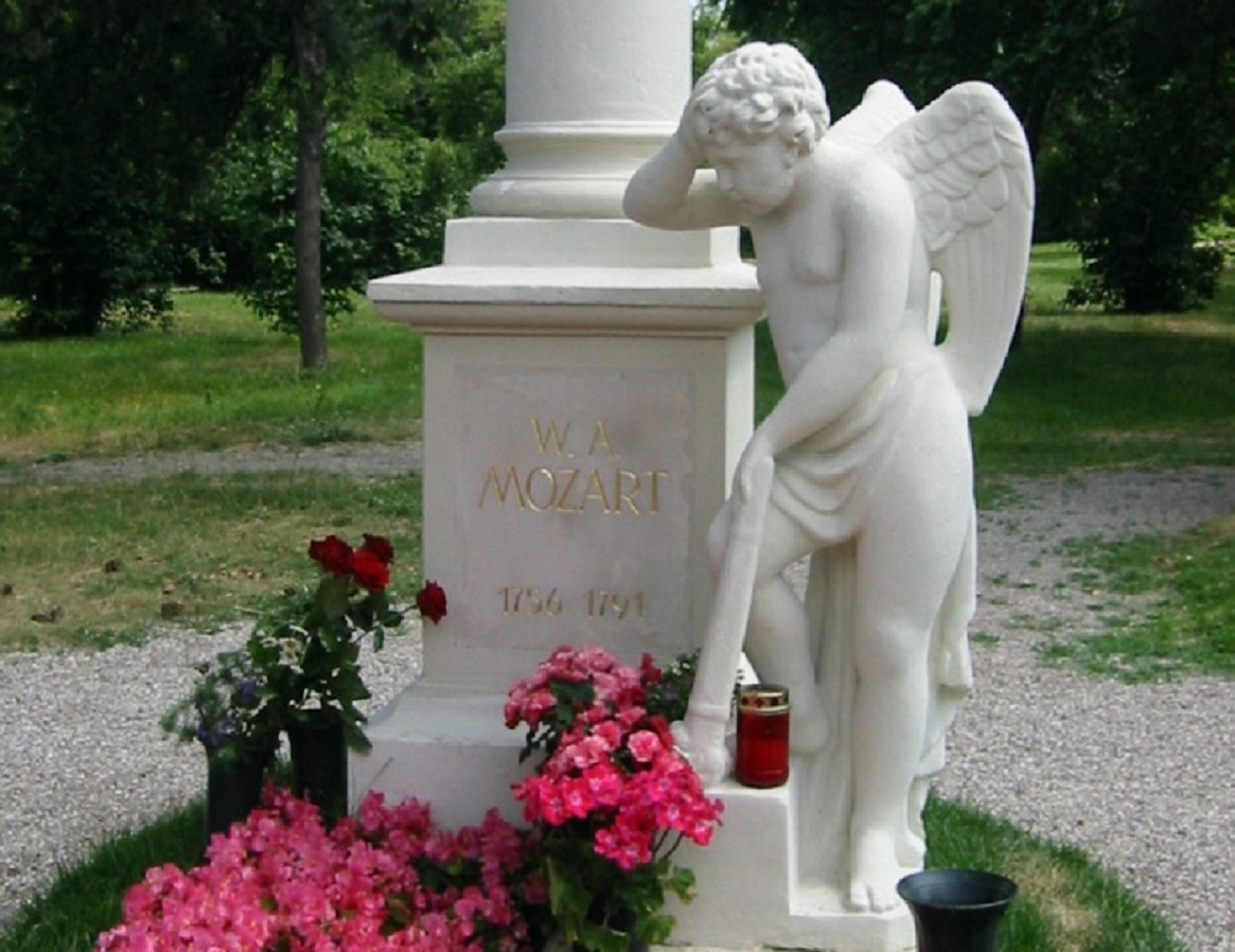 Invisigoth67, CC BY-SA 2.5, Wikimedia Commons
Invisigoth67, CC BY-SA 2.5, Wikimedia Commons
28. End of a Dynasty
If you ever meet someone claiming to be directly descended from Mozart, then they are definitely pulling your leg! Mozart and his wife had six children, only two of whom, both sons, reached adulthood. Neither son ever married, but elder son Carl Thomas had a daughter named Theresia Constanzia with one of his students. Little is known about her except that she played piano and that she died young at the age of 10—possibly from smallpox. According to letters, Carl absolutely adored the little girl and was devastated when she died. Other than Constanzia, there were no other children born to his sons, so the direct line ended with Carl’s death in 1858.
 The Saul Zaentz Company, Amadeus (1984)
The Saul Zaentz Company, Amadeus (1984)
29. Mozart Makes You Smarter
A theory known as the Mozart Effect asserted that if children or babies are exposed to classical music, particularly Mozart, their intelligence will improve. People were quick to jump on the bandwagon, and the state of Georgia even requested money to send every newborn a classical CD. While further tests did show that listening to Mozart immediately before performing mental tasks did give the brain a boost, but the effect only lasted 15 minutes, so unfortunately, your kids will still have to do their homework.
 The Saul Zaentz Company, Amadeus (1984)
The Saul Zaentz Company, Amadeus (1984)
30. Got Milk?
In 2007, an Austrian dairy farmer claimed that playing Mozart’s work to his cows greatly increased their milk production. If he played the music while they were lined up for milking, the cows were calmer and happier, which equaled more milk. If you prefer a slightly more adult beverage, his opera “The Magic Flute” apparently helped the Brunello wine grapes at Carlo Cignozzi’s vineyard in Tuscany to ripen 6 days faster than usual, increasing the alcohol content, and the wine “Flauto Magico” was born. Do you think they need any tasters?
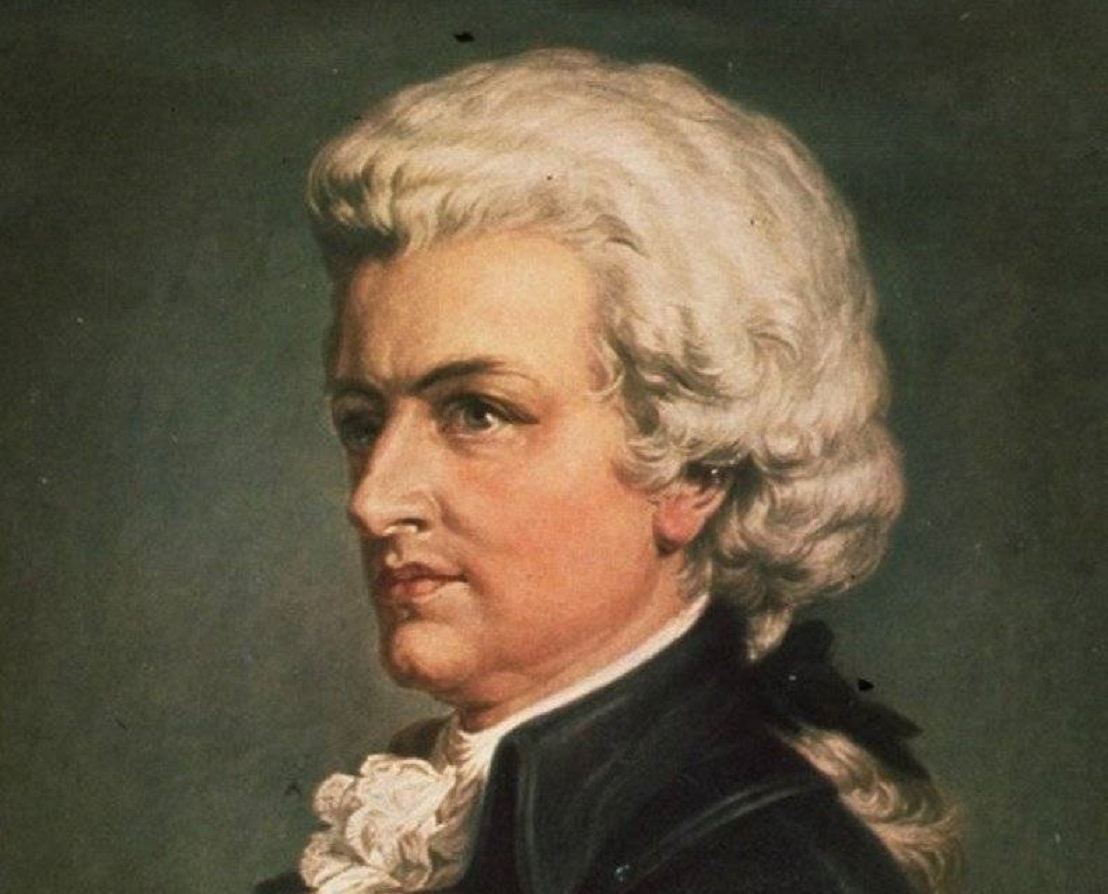 Unknown Author, Wikimedia Commons
Unknown Author, Wikimedia Commons
31. The Little Mozart
Franz Xavier, or “Wolfgang” as he was called by his family, was born just five months before his father Mozart’s death. He was the sixth child, and only the second to survive. Like his father, he learned piano and violin, and started composing at a young age. Also similar to his father, he made his concert debut at a young age, performing in the Theater an der Wien at age 13. Tragically, he died in 1844 from stomach cancer at the age of 53.
 Karl Gottlieb Schweikart, Wikimedia Commons
Karl Gottlieb Schweikart, Wikimedia Commons
32. Big Spender
For a long time, historians have portrayed Mozart as poor, but that has turned out not to be entirely true. On paper, Mozart did quite well, and was in the top 5% of all wage earners in Austria, but the fact was, he just had no idea how to manage his money and spent it faster than he made it. When times were good, he lived luxuriously and was a free spender. He also seemed incapable of saving for a rainy day, so when times were bad, he was stuck and had to ask friends and family for money. By the time he died, there was barely enough money left to bury him, and he was seriously in debt. Easy come, easy go!
 The Saul Zaentz Company, Amadeus (1984)
The Saul Zaentz Company, Amadeus (1984)
33. Poor Man’s Mozart
One of Mozart’s greatest musical influences was the Austrian composer Franz Joseph Haydn, who is often referred to as the “poor man’s Mozart.” This label is pretty unfair as Haydn was a brilliant composer in his own right, and is also known as the father of the symphony and the string quartet. Haydn was both Mozart’s mentor and friend. Mozart dedicated six string quartets to him, which was a pretty unusual move since dedications were mostly to wealthy patrons who commissioned the works. After all—no patron= no money. Considering that Mozart was critical of most composers, the fact that he so greatly admired Haydn should definitely make him worth a second look.
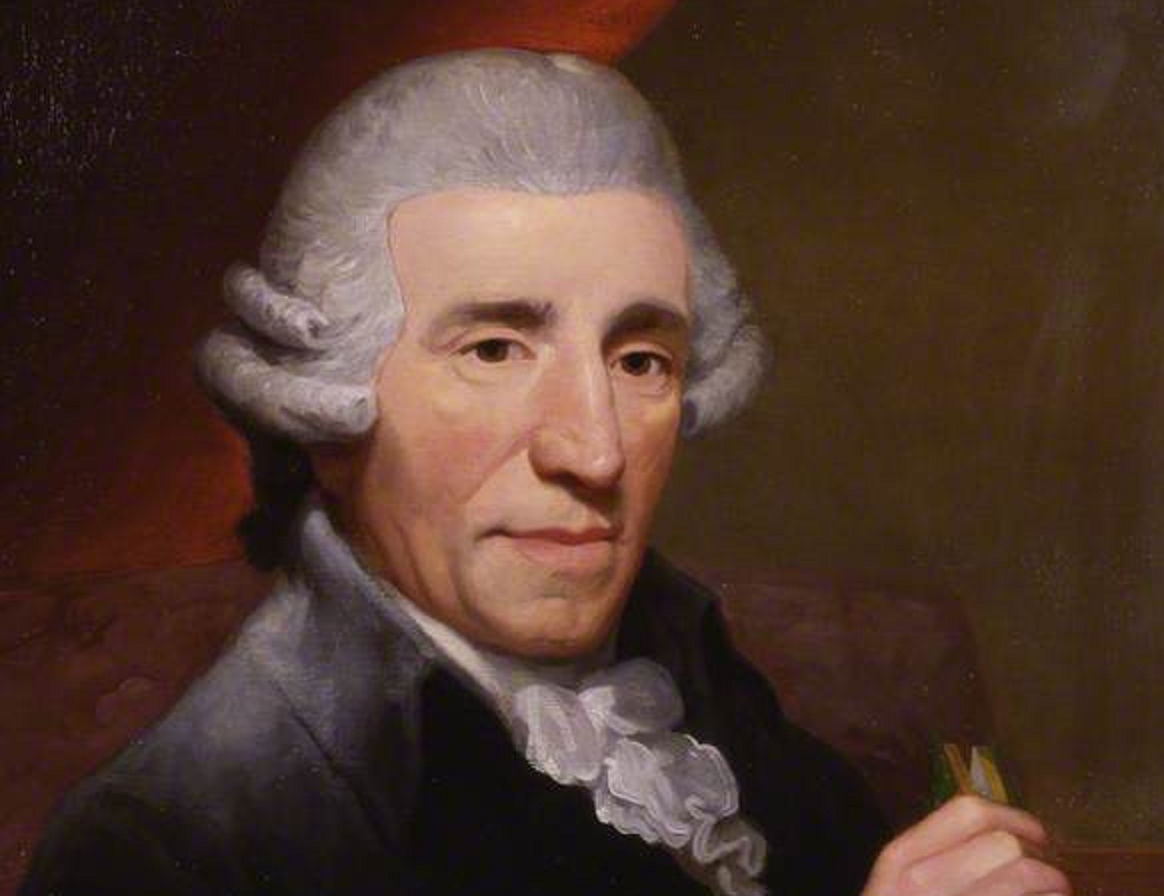 Thomas Hardy, Wikimedia Commons
Thomas Hardy, Wikimedia Commons
34. Just a Few
Classical music composed prior to 1900 is typically divided into different eras, traditionally beginning with the Baroque period (1600-1750), and ending with the Romantic eras (1780-1810). Squarely in the middle of both of these was the Classical era to which Mozart belonged. The period lasted from 1775 to 1825, and matched the classic period in art and literature of the time. Unlike many of the other periods in music which contained a number of great composers, in the Classical era, Haydn, Mozart, and Beethoven get the lion’s share of the glory. That’s a pretty elite group to belong to!
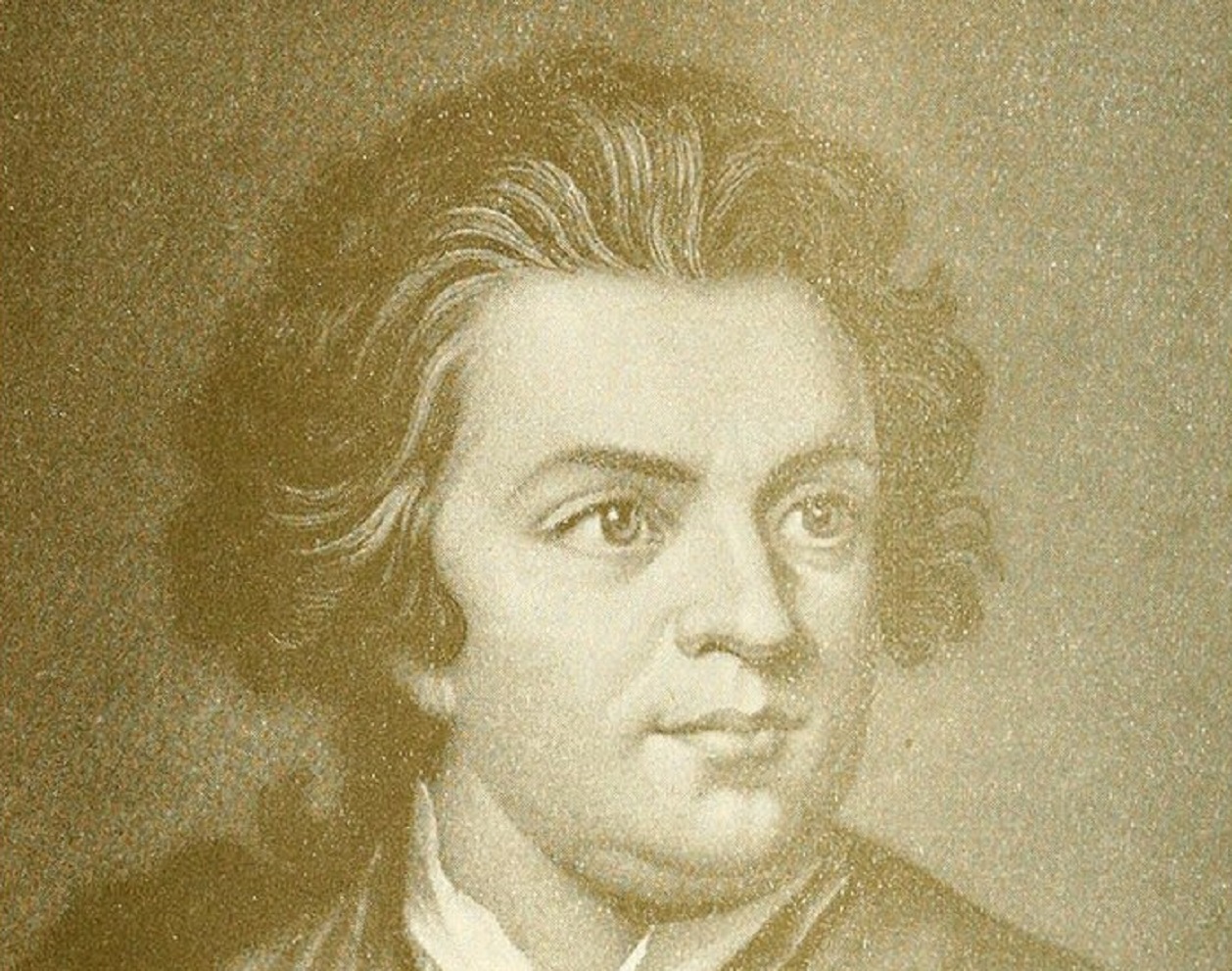 Internet Archive Book Images, Wikimedia Commons
Internet Archive Book Images, Wikimedia Commons
35. Thorn in His Side
Every story needs a villain, and if Mozart was the hero, then Italian composer Antonio Salieri was the villain. Depending on what you read, Salieri was at the very least a crappy composer and Mozart’s tormentor, and at worst, his murderer. In his famous play, and subsequent film, Amadeus, Peter Schafer painted Salieri as Mozart’s enemy, but in truth, they were more like industry rivals. On the other hand, while Salieri’s composing career basically fizzled out in the last 20 years of his life, Mozart’s celebrity continued to grow—even in death—so it’s possible that he was a tad bit jealous, and maybe sick of having his industry rival constantly shoved in his face.
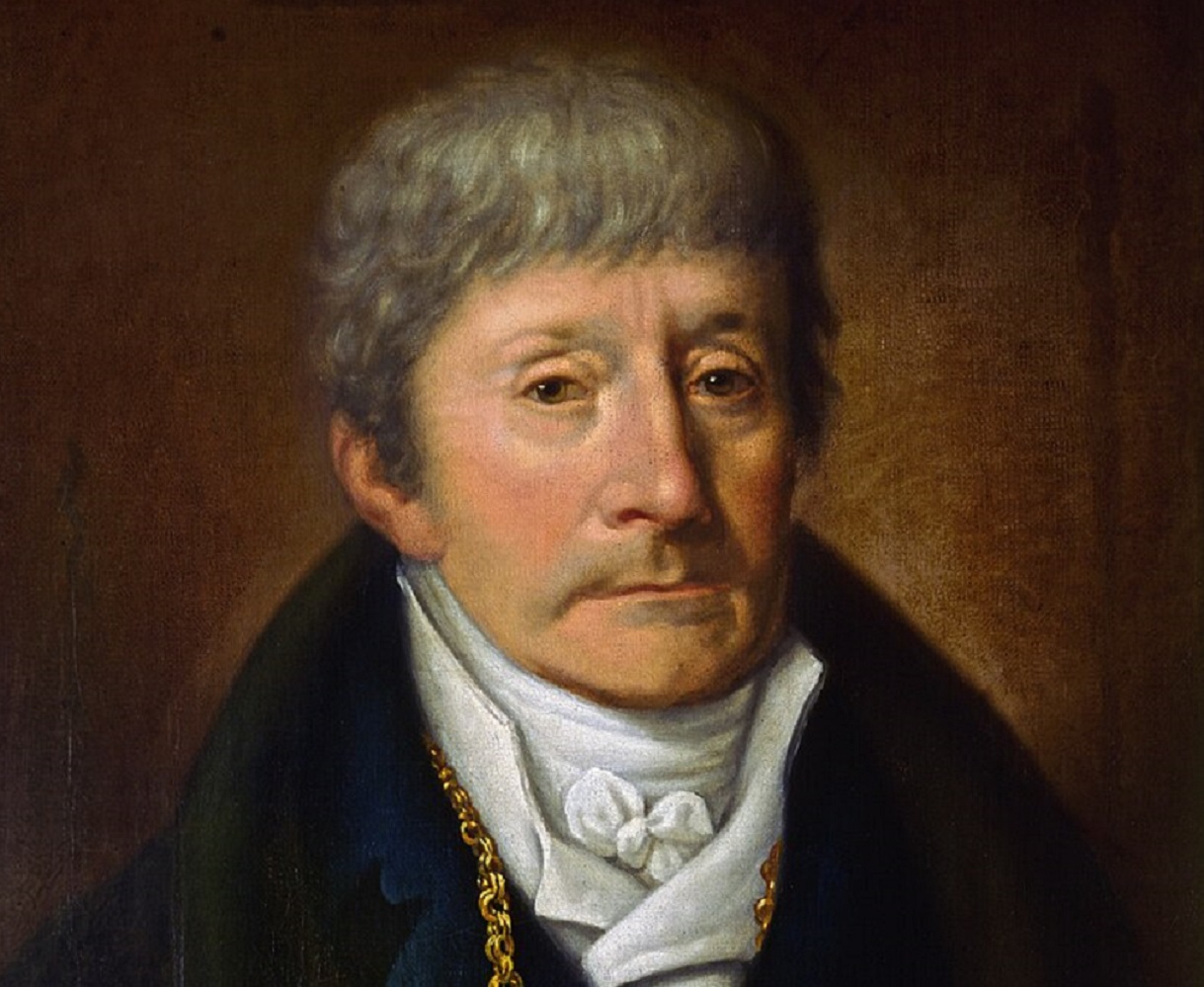 Joseph Willibrord Mähler, Wikimedia Commons
Joseph Willibrord Mähler, Wikimedia Commons
36. Years of his Discontent
From 1773 to 1777 Mozart was employed as a musical servant (court musician) to the ruler of Salzburg, Prince-Archbishop Hieronymus Colloredo. For most composers, that would have been a pretty decent gig. It didn’t pay a whole lot, but it was work, and a chance to compose and perform. Not for Mozart! Despite producing some of his most creative works during those years, he was increasingly miserable in Salzburg. He was creatively unchallenged, and really not into composing the church music that the Archbishop demanded. By 1777, when he couldn’t take it anymore, he asked the Archbishop to release him from his position so that he could seek out bigger and better opportunities in Europe. He was also pretty tired of being under his father’s thumb, and was looking for some personal freedom. Nothing that most 21-year-olds wouldn’t want!
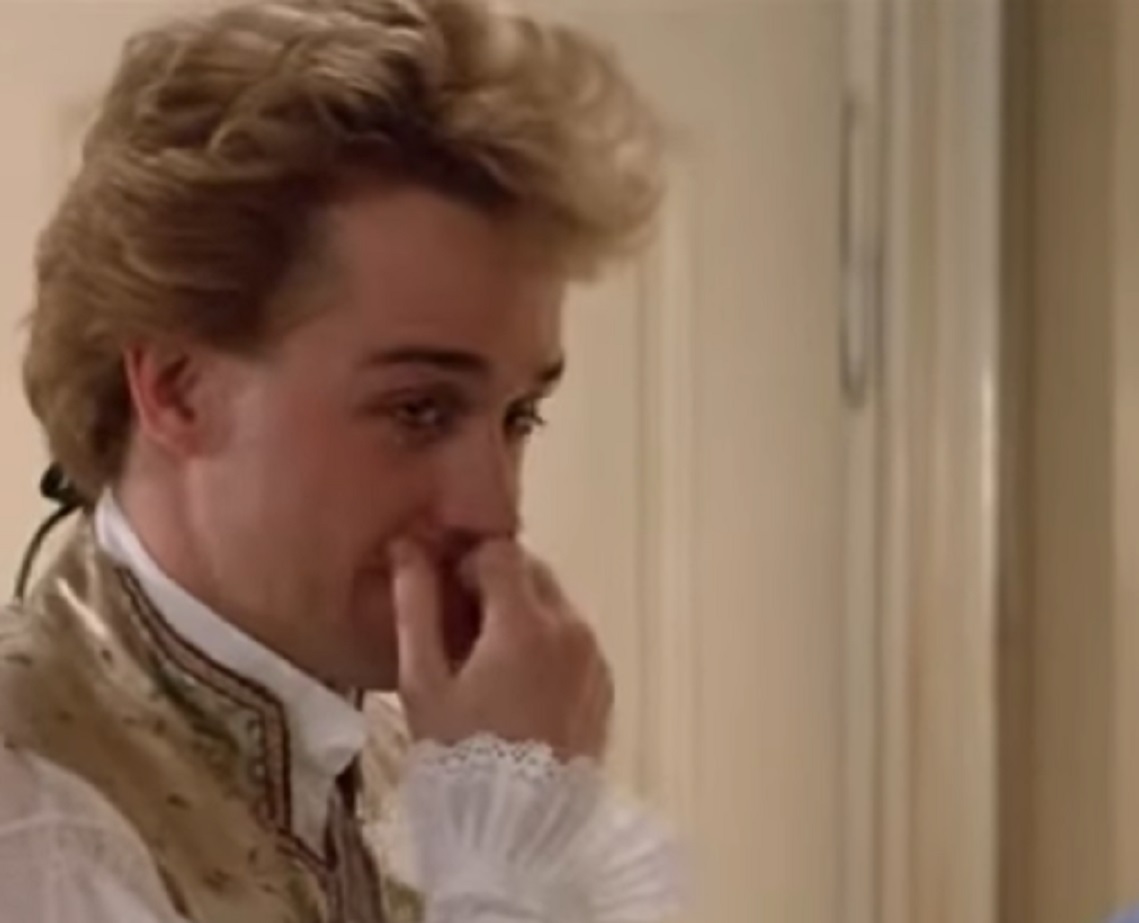 The Saul Zaentz Company, Amadeus (1984)
The Saul Zaentz Company, Amadeus (1984)
37. Lost Genius
Maria Anna Mozart was Mozart’s older sister, and was either an equal or better musician than her brother. As a child, she toured with Mozart and their father, where she received rave reviews. Nannerl (her nickname) also composed and orchestrated Mozart’s first symphony. Unfortunately, Nannerl was born at the wrong time, and as soon as she was of marriageable age, she was forced to stop touring or else she might have been thought of as a prostitute. She did continue composing until she married in 1784, but none of her compositions have survived.
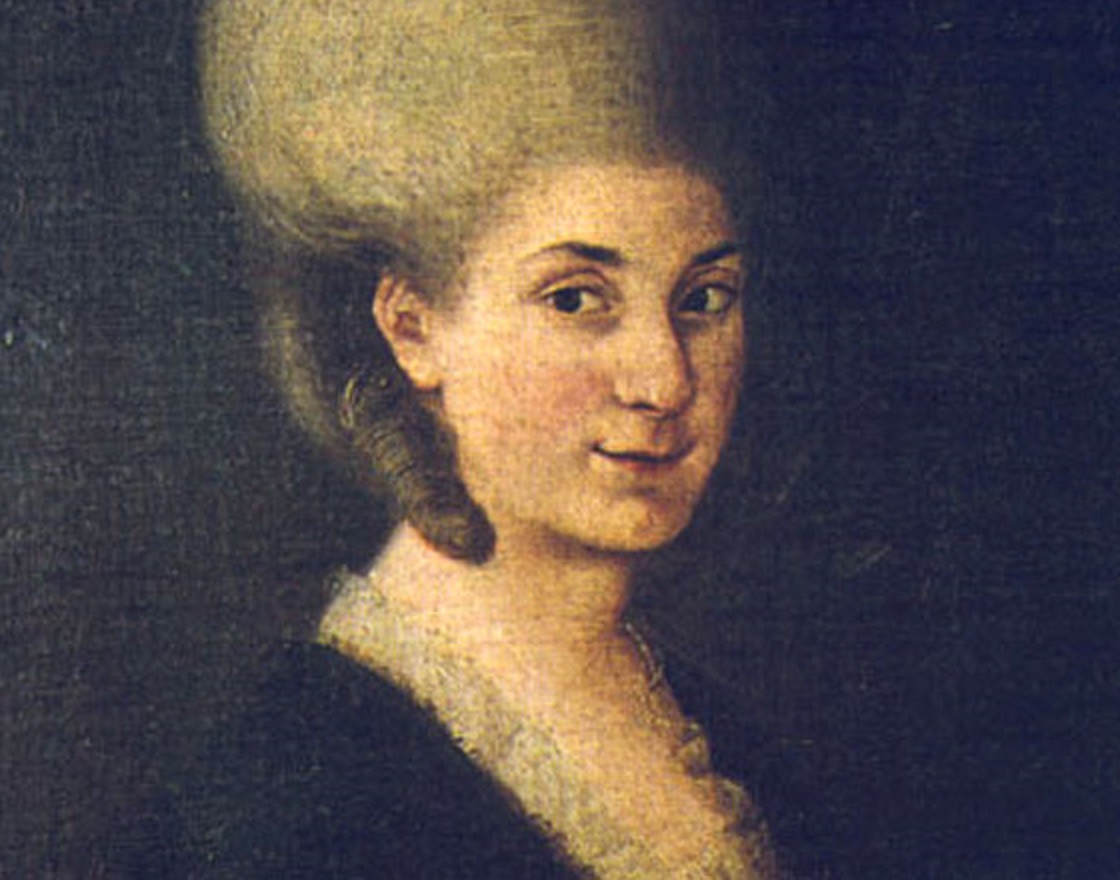 Unknown Author, Wikimedia Commons
Unknown Author, Wikimedia Commons
38. Cool Trick
Even genius composers need the occasional party trick, and Mozart used to play the piano with the keys covered in cloth. He did this at the Salzburg court when he was just six, which shows just how talented he was. If you’ve never tried to play the piano, you’ll have to just believe that it’s really hard to do.
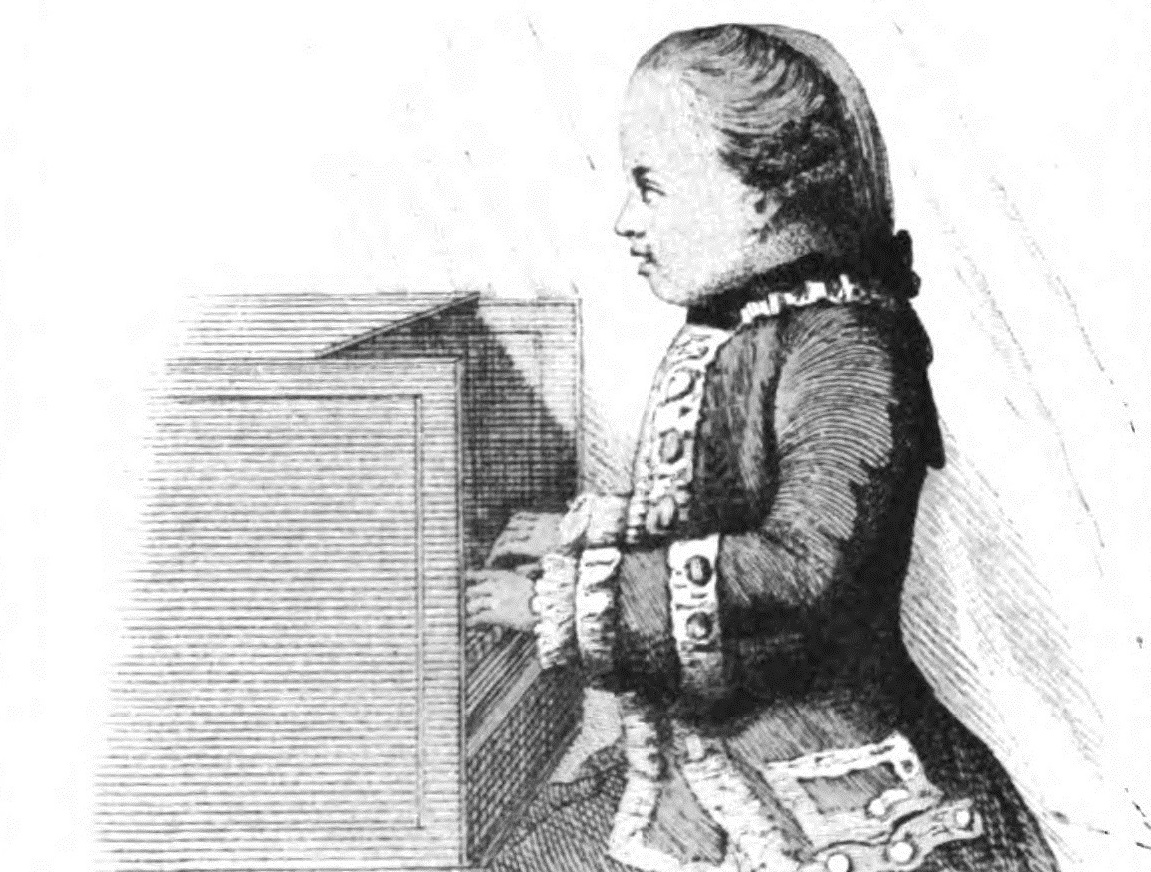 Unknown Author, Wikimedia Commons
Unknown Author, Wikimedia Commons
39. The Almost Wife
Aloysia Weber is best known as the woman who might have married Mozart. She was one of four musical daughters born to the violinist Fridolin Weber, and Mozart was willing to give up his own career to promote her. The poor guy was so lovesick he even composed a series of arias for her, but alas, thanks to some serious meddling on the part of her mother and his father, it didn’t work out.
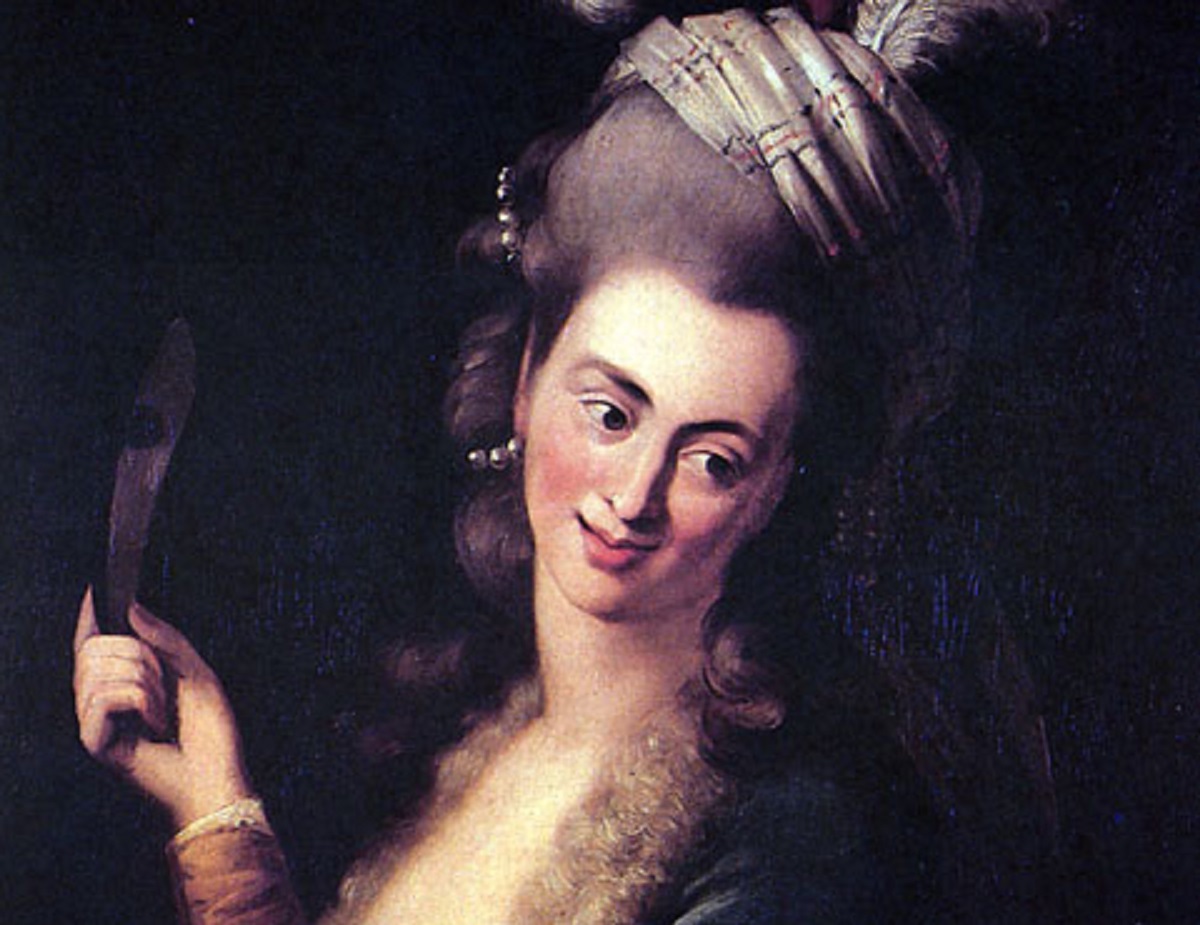 Johann Baptist von Lampi the Elder, Wikimedia Commons
Johann Baptist von Lampi the Elder, Wikimedia Commons
40. The Perfect Match
Sometime after being rejected by Aloysia Weber, Mozart moved into a room in the Weber house, and started courting one of her younger sisters, Constanze. Against the wishes of his father, he married her, and she turned out to be the true love of his life. Their letters show that the pair was extremely happy together. She was musically talented, and she was able to manage the house so that he could be left free to compose.
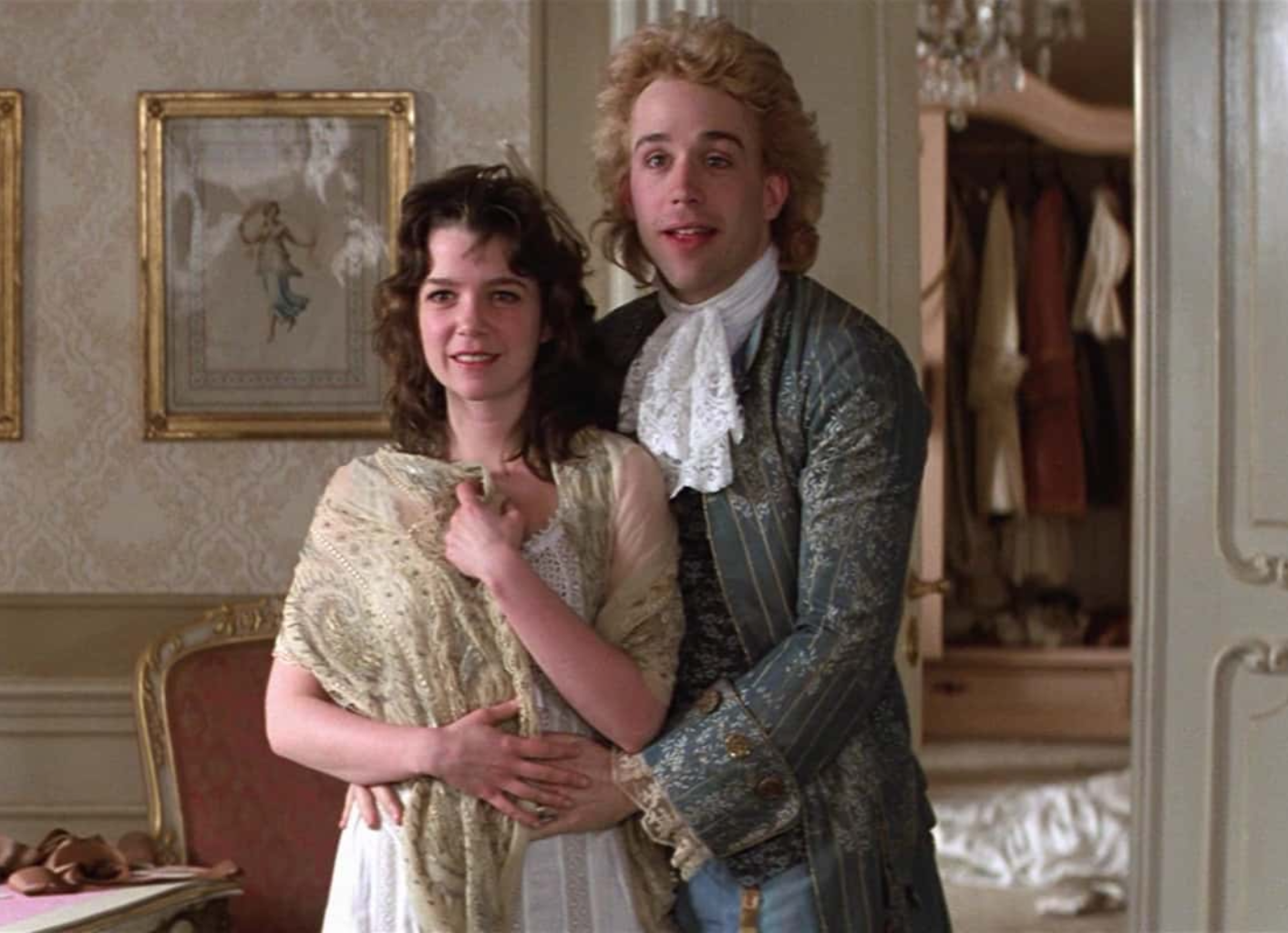 The Saul Zaentz Company, Amadeus (1984)
The Saul Zaentz Company, Amadeus (1984)
41. Dark Times
While Leopold Mozart was the strict parent, Mozart’s mother Anna Maria was the more loving and carefree one in the family, and Mozart loved her like crazy. She traveled with him throughout Europe while he was looking for work, but died of an unknown illness in her hotel room in Paris in 1778, and Mozart was left grieving and alone in a place that he felt had not been kind to him.
 Johann Nepomuk della Croce, Wikimedia Commons
Johann Nepomuk della Croce, Wikimedia Commons
42. Kissing Cousins
When Mozart was 21, he met his 19-year-old cousin Maria Anna Thekla Mozart, or Marianne, and developed a close, if not intimate relationship with her. Ten of their letters have been preserved and are called the Bäsle letters which translates to Little Cousin letters. The letters contain some pretty filthy sexual innuendo that would make it hard to believe they were just friends. In January 1779, she took him up on an invitation to come visit, and stayed in Salzburg with Mozart for 10 weeks. It’s possible that she was hoping for a marriage proposal from Mozart, but for whatever reason, it never materialized and their relationship cooled.
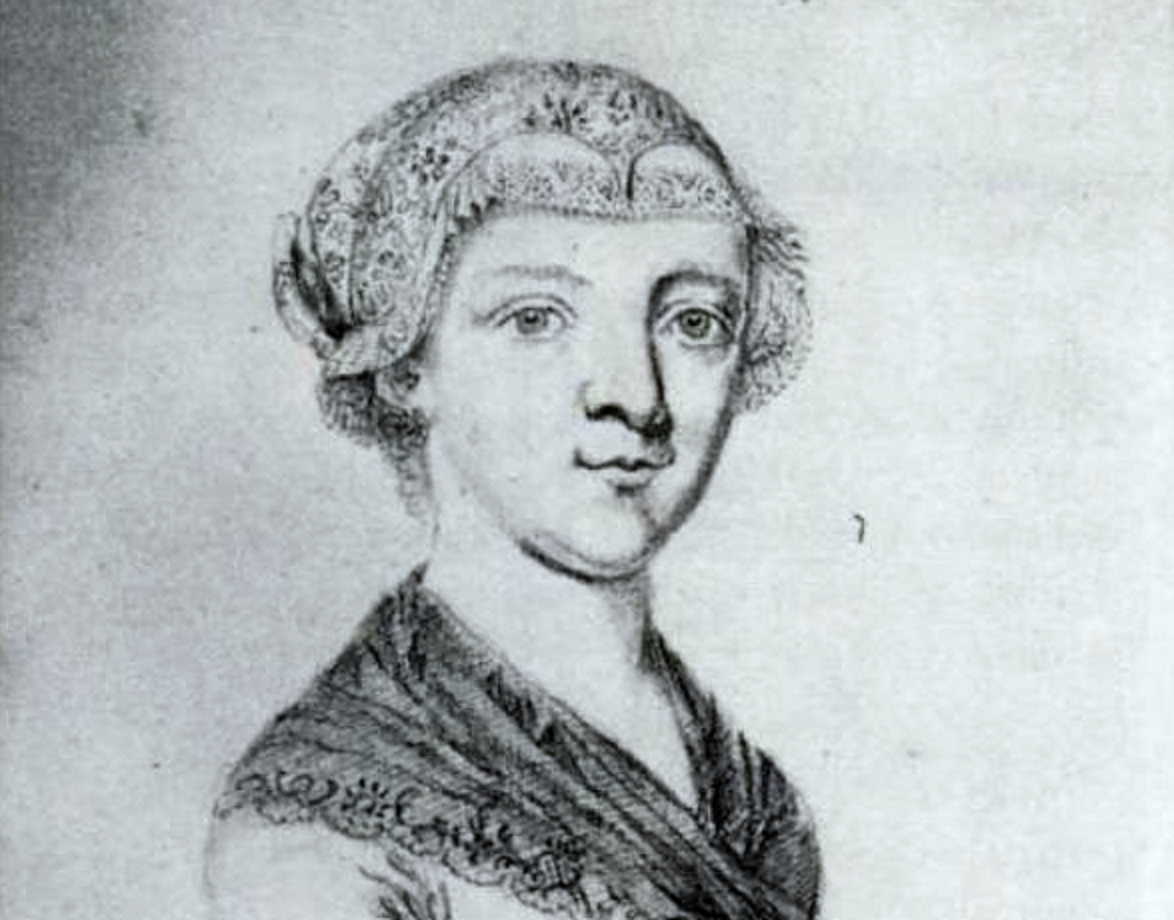 Maria Anna Thekla Mozart, Wikimedia Commons
Maria Anna Thekla Mozart, Wikimedia Commons
43. Macabre Souvenir
In Mozart’s time, only the super rich were buried in permanent graves. Mozart was not one of those fortunate souls and was buried in a community grave along with other bodies. Every decade or so, the bodies were cleared away to make room for new bodies, and this is where the story takes a bit of a twisted turn. A music-loving grave-digger supposedly made note of where Mozart was buried, and when the bones were cleared away in 1801, he helped himself to a souvenir: Mozart’s skull. The skull was passed down to his descendants (though who knows what they would have done with it) and then donated to the Mozarteum Foundation in Salzburg in 1901.
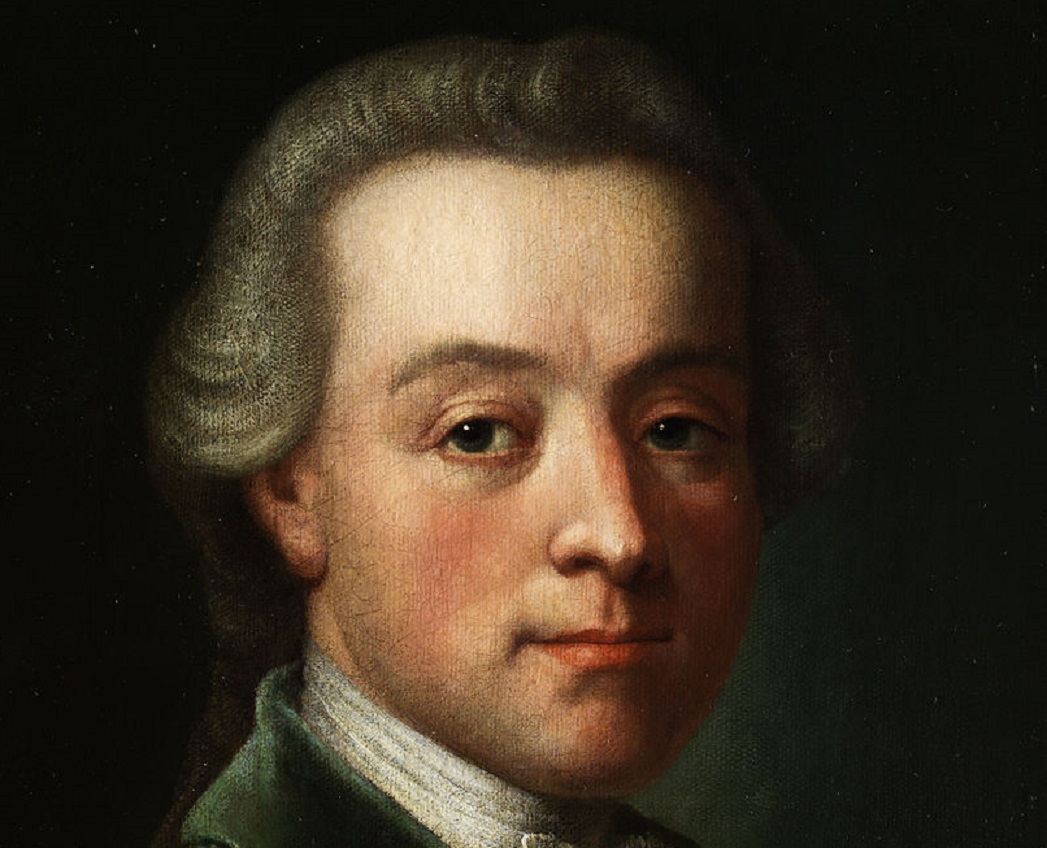 Unknown Author, Wikimedia Commons
Unknown Author, Wikimedia Commons
44. Skeletons in the Closet
In 2004, researchers from Innsbruck’s Institute of forensic medicine secured permission to dig up a couple of Mozart’s relatives and perform some DNA tests on the remains. They were hoping that the tests would confirm once and for all that the skull at the Mozarteum Foundation was in fact Mozart’s. What they found was pretty shocking. The DNA from the skull did not match the DNA on his two "relatives," and the DNA from the relatives didn’t match. This basically meant one of two things. Either somebody in Mozart’s family was messing around, or the skull was a fake. If the skull is a fake, then the real one will probably never be found, but if the skull is real, then who the heck did they dig up?
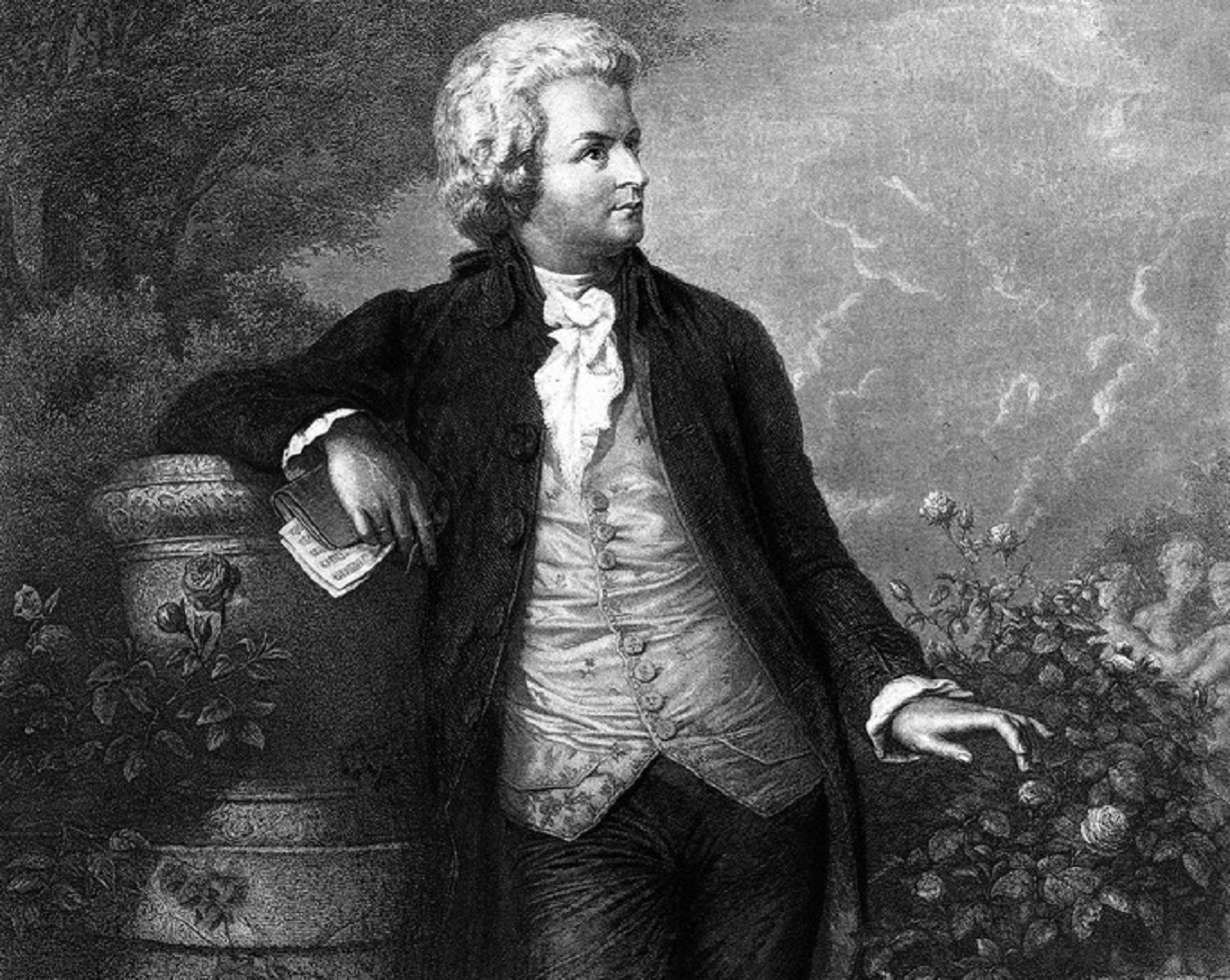 Paul Barfus ,Wikimedia Commons
Paul Barfus ,Wikimedia Commons
45. Not So Glorious Food
Mozart was a great lover of food—especially liver dumplings with sauerkraut. He was also known to enjoy his pork chops and a recent study suggests that pork may literally have been the death of him. While his official cause of death is unknown, a strong possibility is that he died from an infection caused by undercooked pork chops. Okay fine, order pork well done, but don’t you dare come near my steak with those two words.
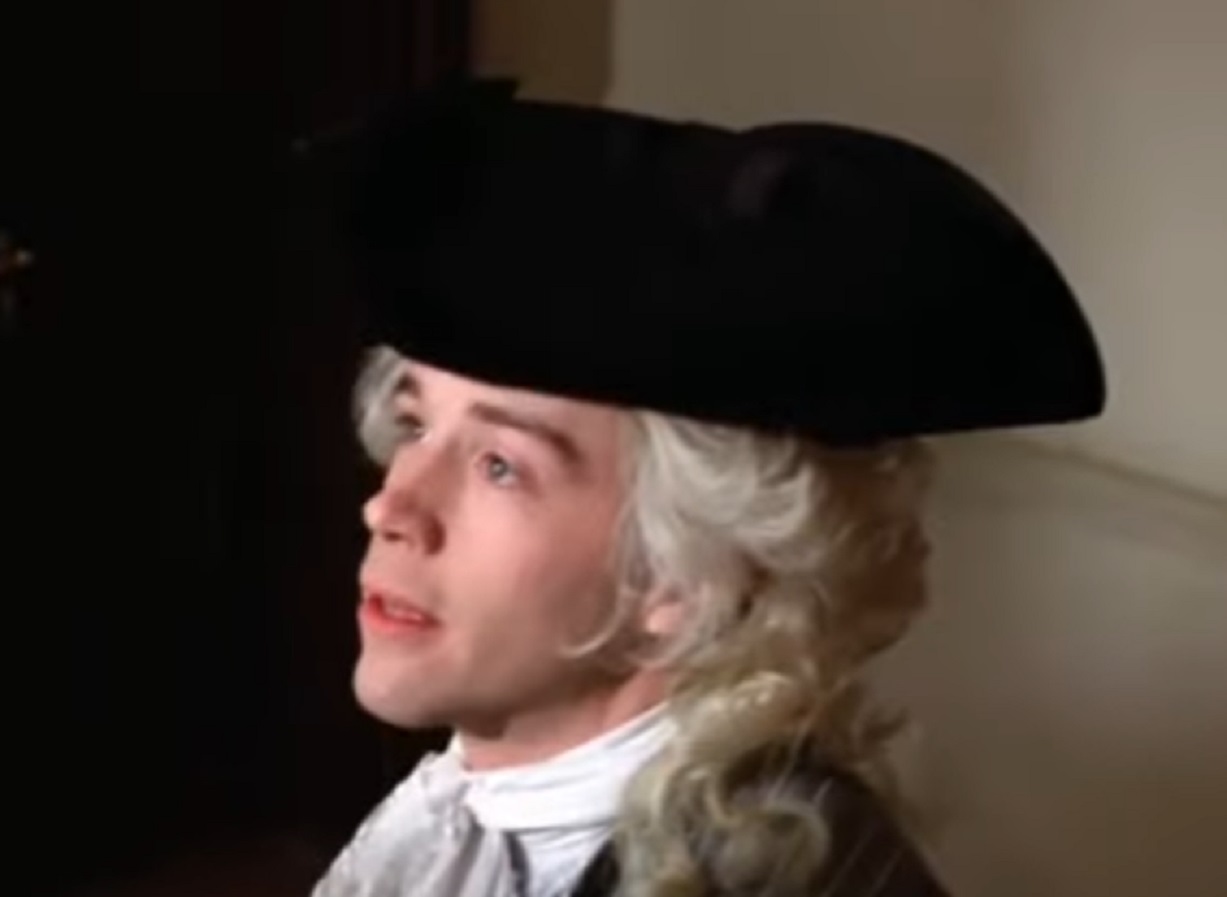 The Saul Zaentz Company, Amadeus (1984)
The Saul Zaentz Company, Amadeus (1984)
46. Purely Gossip
Classical music composers were the rock stars of their time, and like any celebrity who dies young, there is always speculation about their death. The final portrait of Mozart, painted one year before his death in 1790, portrayed his face as puffy and bloated, and attributed it to excessive drinking. In 2018, a new book by a retired British surgeon suggested that Mozart was not in fact an alcoholic. He argues that not only was alcoholism rare among composers, but it would have been virtually impossible for him to create as much work as he did if he had been. Guess the hard-partying lifestyle wasn’t as viable for classical composers as it seems to be for modern musicians.
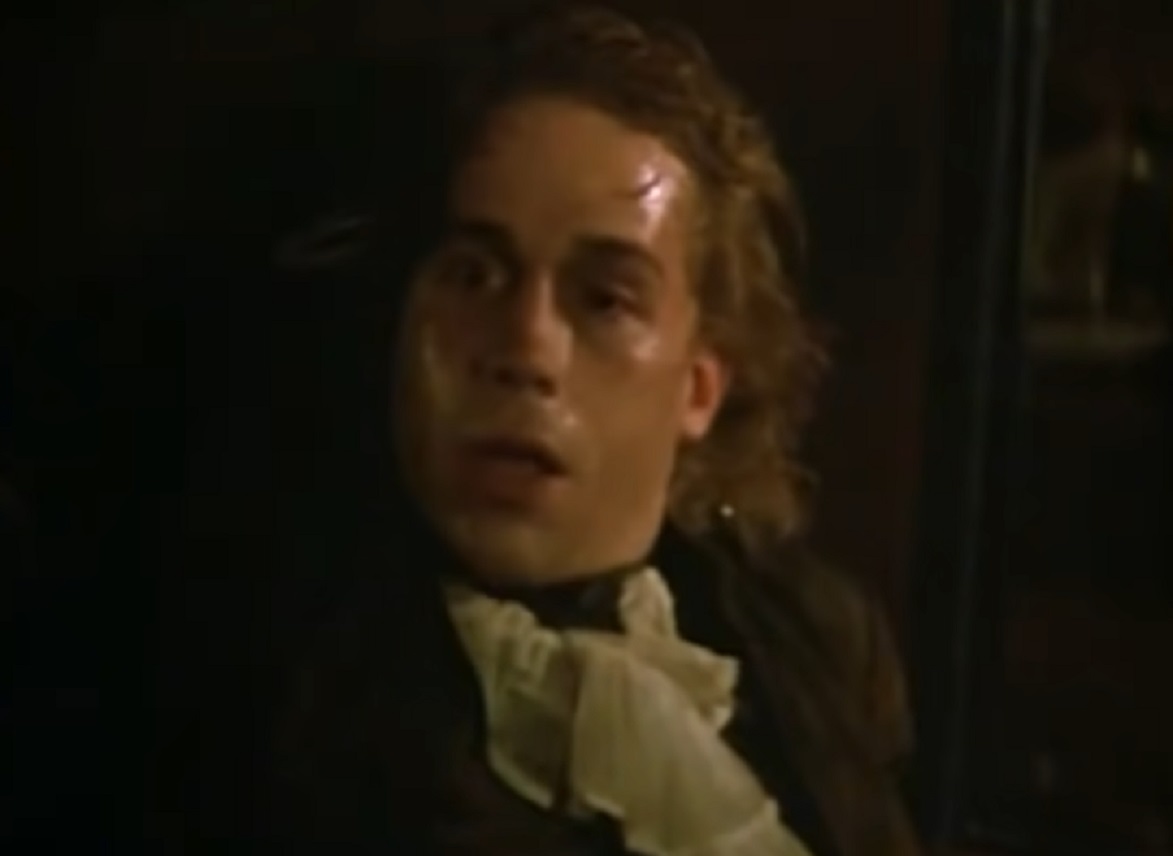 The Saul Zaentz Company, Amadeus (1984)
The Saul Zaentz Company, Amadeus (1984)
Sources: 1, 2, 3, 4, 5, 6, 7, 8, 9, 10, 11, 12, 13, 14, 15, 16, 17, 18, 19, 20, 21, 22, 23, 24, 25, 26, 27, 28, 29, 30, 31, 32, 33, 34, 35, 36, 37, 38, 39, 40, 41, 42, 43, 44, 45, 46, 47, 48, 49, 50, 51, 52

